THE



This was a busy and rewarding semester at the Center. We hosted our 71st annual conference, “Anti-Racist Strategies in Education in Latin America: Perspectives on State and Grassroot Projects.” The guest speakers came from Chile, Colombia, Ecuador, Mexico, and Puerto Rico. Dr. Solsiree del Moral, the Center’s Bacardi Family Eminent Scholar, delivered the keynote address. With the Sociology and Anthropology Departments we inaugurated the Ethnography Lab, and the Masters in Development Practice (MDP) program celebrated its twelve anniversary.
We are graduating a cohort of twelve MALAS and ten MDP students. It is sad to let our students go but rewarding to listen to their presentations in the Fieldwork Festival, and to know that they are following fascinating paths, as some will pursue a PhD, others will work for NGOs or the government. We are looking forward to welcoming new cohorts of MDP and MALAS students in August.
Over the course of the semester, we hired four new professors to the faculty of the Center for Latin American Studies. I want to thank the Center-based faculty for their guidance and wisdom during the hiring process, and in particular to the members of the search committees: Christopher Busey, Raúl Sánchez, Paola Uparela, Rebecca Hanson, Tace Hendrick, Bertha Hernández, Juliana Restrepo Sanín, Susan Paulson, Tim Murtha, Margarita Vargas Betancourt, and Paul Ortiz.
Let me very briefly introduce the new additions to our Center-based faculty:
Dr. Ariadna Tenorio has a PhD in Spanish, University of Kansas, and a Doctorado en Ciencias Sociales,
Universidad de Colima. Her areas of research are Afro-Latin American Culture and Postcolonial Studies.
Dr. Rafael Ramírez Solórzano has a PhD in Chicana/o and Central American Studies, University of California Los Angeles. His research and teaching interests are Latinx Social Movements, Racial/Latinx Geographies, Women of Color Feminism, Latina/o/x Political Theory, Qualitative and Archival Research Methods.
Dr. Margaret Weeks has a PhD in Latin American history, Harvard University. Her research specializations include twentieth-century Brazil, Latin American feminisms, reproductive justice, sexuality, race, and labor.
Dr. Luis Felipe Gómez Lomelí has a PhD in Spanish and Portuguese, University of Kansas and a PhD in Science and Culture, Universidad Autónoma de Madrid. His research interests are ecocriticism, history and philosophy of science, Latin American literature, and creative writing.
We are thrilled that Ave Barrera will be the Kislak Family Foundation Writer in Residence the fall. She will teach a creative writing course in Spanish, and host reading groups on novels and short stories by female writers who were silenced during the so-called Latin American literary boom of the 1960s and 70s.
We will miss professors Christopher Busey and Nicholas Vargas who are leaving the Center and the University of Florida.
Center for Latin American Studies 319 Grinter Hall PO Box 115530 Gainesville, FL 32611-5530 (352) 273-4705 latam.ufl.edu
CENTER-BASED FACULTY

Carlos de la Torre Director
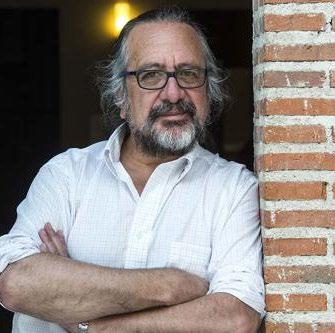
Emilio Bruna (LAS/WEC)
Christopher L. Busey (LAS/Education)
Jonathan Dain (LAS/SFFGS)
Glenn Galloway Director, MDP (LAS)
Rebecca Hanson (LAS/Sociology)
Karen Kainer (LAS/SFFGS)
Clate Korsant Asst. Director of Academic Affairs (LAS)
Bette Loiselle Director, TCD (LAS/WEC)
Carmen Martínez Novo (LAS)
Timothy Murtha (LAS/DCP)
Susan Paulson (LAS)
Mary Risner Assoc. Director, Outreach & LABE (LAS)
J. Richard Stepp (LAS/Anthropology)
Carlos Suárez Carrasquillo (LAS/Poli.Sci.)
Welson Tremura Director, FBLI (LAS/Music)
Catherine Tucker (LAS/Anthropology)
Pilar Useche (LAS/FRE)
Nicholas Vargas (LAS/Sociology)
Robert Walker (LAS/Geography)
Writer, editor, designer: Christa Markley Dr. Carlos de la Torre CENTER DIRECTOR11 17
New perspectives, deeper understandings
Interactions with Spring 2023 Bacardi Family Eminent Scholar Solsiree Del Moral spark student reflection on identity, belonging, and migration
Charles Wood Thesis Award winner reflects on research in her own community
Alumna Nashia Graneau (MALAS 2022 ) talks about her thesis on the lives of Kalinago women in Dominica
Delving into the riches of the Latin American & Caribbean Collection
Extraordinary resources for research in Special and Area Studies Collections
STUDENT SPOTLIGHTS
STUDENT REFLECTIONS
Parting words for the MALAS 2023 cohort
by Thacher LoutinCELEBRATING OUR PROGRAMS
Landmark MDP program celebrates 12-year milestone
OUTREACH
MALAS students gain experience at conferences
Maricarmen Torres Medina curates “Echoes Across the Antilles” exhibit
Expanding collaborations in international education; traveling suitcase curriculum
Florida educators explore international tourism at 2023 Global Business Summit
20 21 24
5 7 9 4 18 25
Ivy Chen adds scholarly dimensions to career experience in museums
ALUMNI SPOTLIGHT
John Mason
MALAS 1998
Three Center alumni return to lead global career sessions
Rebecca Hanson establishes International Ethnography Lab
FACULTY SPOTLIGHT RESEARCH SPOTLIGHT
Field visit facilitates next steps in NSF-funded research on biocultural heritage
25 12
14 16 27 29 31
EVENTS
GRADUATIONS
FACULTY UPDATES
FACULTY FAREWELLS
DONORS THANK YOU
MALAS 2023 graduate and student representative Thacher Loutin says goodbye to her classmates and the Center
BY THACHER LOUTINMy fellow MALAS 2023 graduating cohort: we have reached an historic milestone that we will remember for the rest of our lives. This period is a time of reflection, because it marks the end of one era of your life and the beginning of something new.
Since its inception, the Center for Latin American Studies has sought to train, educate and produce impeccable graduates. This Center has proven to be a lasting symbol of international integration, nurturing successive leaders and scholars.
We are graduates of the University of Florida. More specifically, we can boast of being graduates from the Center for Latin American Studies. We have been provided with an experience like none other—an experience which was full of cultural exchanges, and opportunities to experience intricate aspects of diversity.

As an international graduate student like many of you, from Jamaica, I remember vividly walking into a new adventure stepping outside of my familiar territory in order to rise to the occasion of my highest potential in the Center for Latin American Studies.

Like myself, many of us were bright-eyed and bushy-tailed, full of youthful exuberance and zeal. This Center allowed all of us to bring our imagination, explore our passions and create our own pathway of excellence. We were immersed into an engaged, innovative community of academic excellence with the university’s best faculty leading the way.
As we bask in this feeling of pride, let us not forget those who have helped us throughout this journey in some way or another. To the dedicated faculty and staff in the Center for Latin American Studies, we acknowledge your unwavering commitment and student centered approach. Thank you for making us a more resilient, tenacious and competent group of individuals ready to take up any challenge as they come.
To the friends who became family, the ones who we constantly relied on. Who provided occasional emotional support and even sometimes much needed criticism—to you we are thankful as without you this journey would have never been the same.
The truth is we all fought our own battles, but whatever our battles may have been, we did not give up, we endured, and we made it to the end of this journey. We can therefore reflect on those low days where we lacked self-belief and self-confidence and we should all applaud ourselves and feel proud of this accomplishment because Vinimos! Vimos! Conquistamos!
MALAS 2023 graduating class, let our multicultural heritage influence messages of cohesion that impact the world. Together we can make it happen. We must use our voices to inspire and occupy spaces of global influence. Be the voices of transformation; we must use our voices to shape public opinion by talking about issues of inclusion and equality. We must use this degree not just for ourselves but for the benefit of others because that is what the world needs.
In all of this, let us not forget to give back to this community that shaped us. The Center for Latin American Studies needs greater support from its alumni and we are now officially one of them. As we close this chapter of our lives and move on to the next, degree in arm, there is a lot we risk. We risk oblivion, we risk making the wrong choices, we risk disappointing those we care about; but more than that, we risk failing by not trying. So, we will make those mistakes, we will inevitably disappoint people we care about and we will make the wrong choices here and there, but in all of these, let us always look for the lessons to be learned. People are going to judge you, doubt you and make you doubt yourself. Do not let the words of others and your own self-doubt limit you. Going forth, let us define success on our own terms! Let us rise with even more grit after every fall! Let us actualize the ambition cradled in us!
MALAS 2023, with this additional badge to your collection, may you continue testing the limits and achieve all you want in life. My advice to you as a graduate is to be a lifelong learner. The world needs your talents, your passion, and your vision more than ever before. The Center for Latin American Studies has prepared us well. Our experience here has shaped us into confident individuals, capable leaders, and fierce competitors on any global stage. We are the fruit of their vision. We can and will succeed against all odds. Felicitaciones! Congratulations!
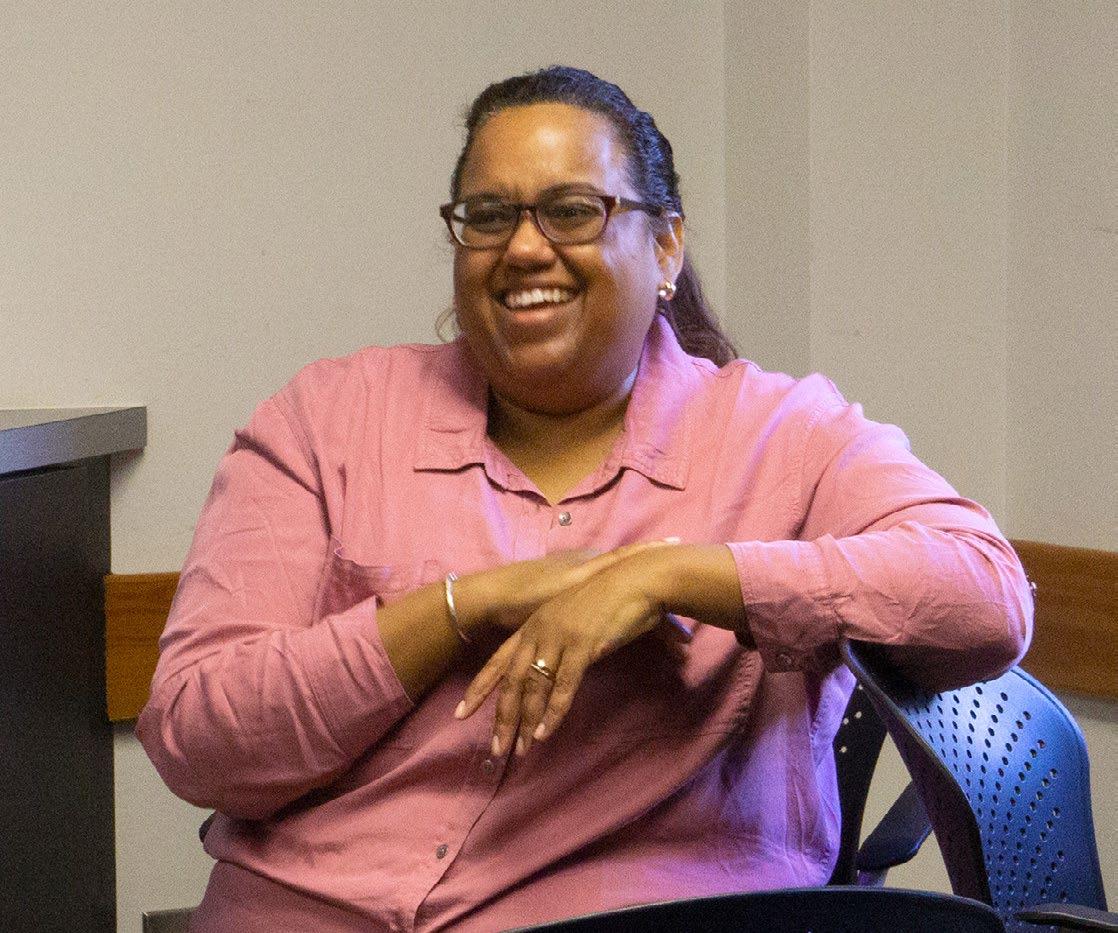 BY MARICARMEN TORRES MEDINA
BY MARICARMEN TORRES MEDINA
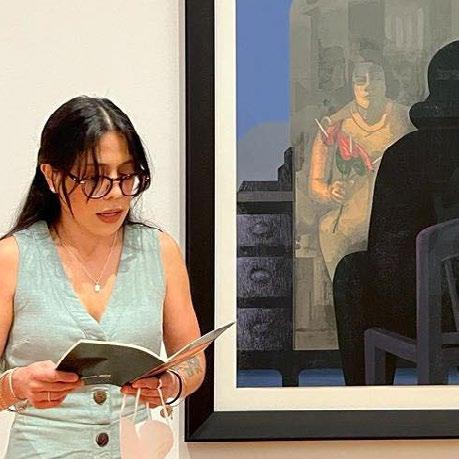
This semester I had the privilege to work with Solsiree Del Moral, the Bacardi Family Eminent Scholar visiting the Center for Latin American Studies during the semester of Spring 2023. My first encounter with Solsiree was impressive. She is very tall! But not only that, she has a presence that comes from what I think is her initial serious face and her height combined. She also speaks very articulately and with confidence. Interestingly though, this facade melts away as soon as she sits down with you. Solsiree is very attentive. She follows your conversation with all her face. She listens, she smiles, and then she asks for more. Her reflectiveness is palpable, and she does well in bringing her interlocutors into this exercise of active listening and thinking.
During our first conversation, I found out she was a fellow Puerto Rican. She told me: “But I am a Puerto Rican from here.” I knew what she meant, and why she clarified. I felt bad for her having to do so. What she meant is that she is not from the island. Then, she shared her connection to the place. Her family is from the southern part of the island, from Arroyo, where the guttural “r” is very prevalent, when “carro” (car) is spoken almost like a French person learning Spanish. It reminded me of the way my mother and aunt speak; they are also from the southern part. But why the clarification, you must ask yourself... Here there is the silent understanding amongst us Puerto Ricans— born on the island or not—that, notwithstanding the pride we all carry about our flag, for our sports teams in international competitions, about our music... something still separates us. As our conversation was carried away entirely in English, I knew that one of the main distinctions she implied was the language.
Although Puerto Ricans have been U.S. citizens since 1917 through the Jones Law, our first language is Spanish. We have a long history with the U.S. since its arrival in 1898, when an Americanization project was put into place but the cultural and linguistic assimilation simply failed. Therefore, the Puerto Ricans who “are not from the island,” that either were born or grew up in the U.S., might not speak Spanish, or, if they do, might not do it fluently, or might not feel confident enough to express themselves fully in the language.
Growing up in Puerto Rico in the 90s, I started to see a change in how “Puerto Rican-ness” was understood. Migration has always been part of our culture—something we share with fellow Caribbean islands—where we are either forced or compelled to migrate for a short period, and in other cases, in a more permanent way, for obtaining job opportunities, education, or even security. There is something about how our Caribbean states are built that is dependent on our geography, which is
a kind of burden to our economic development and growth: limited goods, mobility, isolation from other countries, etc. I used to listen to adults tell me that an undeniable proof of one’s origin—therefore identification—is to be born in the same place one claims to come from. Therefore, through that rationality, the people who claim to be Puerto Ricans but who were not born on the island, and did not speak Spanish, could not be considered “real Puerto Ricans.” They would say: “They are Nuyoricans.” But that is a terrible misunderstanding of our history and a sign of a very cheap and ongoing nationalism. Understanding migratory phenomena is to understand the shades of gray. The connection to language, culture, and territory is mediated by different aspects. It is in the precise conflict of definitions and identities that one might be able to grasp the richness of the debates.
Solsiree’s scholarship has centered on the study of Latin America and the Caribbean, with a special interest in Puerto Rico. Her choice of topics concentrates on race, colonialism, and education. Her most recent research focuses on studying street children between the 1900s and 1960s, whom she identifies as “a heterogeneous group including the homeless children who worked and slept in the streets as well as the housed poor and working-class children who earned wages in public spaces.”
During my work with her, I was able to collaborate with her on a new project that follows this research, but expands the timeline of the archival materials and also takes into consideration legal processes against the state by the parents of some kids who were subjected to the juvenile judicial system. At her coloquio this semester, she presented the topic “Los Olvidados”
(“the Forgotten”) centering on the analysis of the welfare and institutional care of these “niños realengos” (“street children”) in Puerto Rico. Her presentation and research is rich in archival materials, including articles from Puerto Rican newspapers as well as photography of some of the street children. Although her work will show the structural limitations of the governing class in Puerto Rico regarding child welfare and care, in her methods she hopes to highlight stories of the children themselves. For example, she shared with me that the kids were able to, in many cases, trick the system by saying that they were too young to be incarcerated, or that the street children were often able to develop their own communities of support in a non-hierarchical manner.
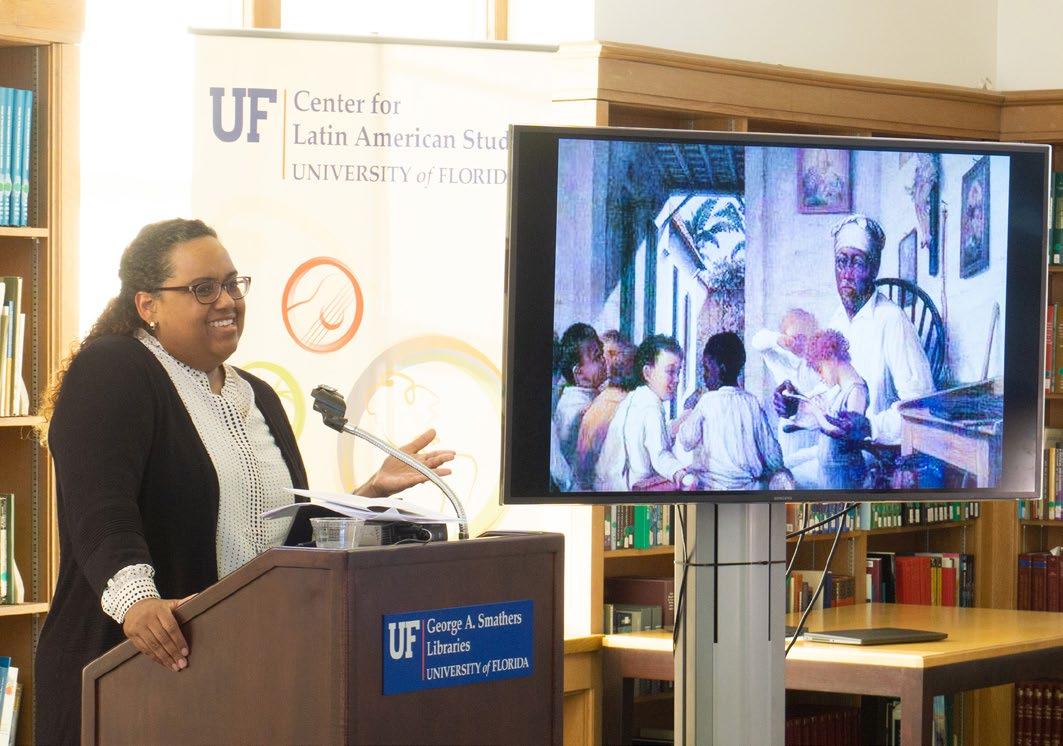
Throughout her time at the Center, Solsiree also taught the course “History of Afro-Latin America.” The class was composed mainly of first-generation migrants and second- or thirdgeneration sons and daughters of Latin American migrants. I had the opportunity to join them during their last class, as they ended on the theme of “Diasporic Belonging.” They were discussing the book “Racial Innocence: Unmasking Latino Anti-Black Bias and the Struggle for Equality,” written by Tanya Katerí Hernández. Solsiree guided the group through Socratic-style discussion, as we talked about the author, explored how the book differed from other texts, and posed questions about the arguments.
During the discussion, I realized something: my understanding of racial relationships was limited to the very local experiences of Puerto Rico, and the implications of the U.S. political treatment of the island within its territorial limits and social dynamics. Latinos who were born or grew up in the U.S. are subjected more closely to the racial inequalities, and legal and social barriers that are prevalent in the country. In the U.S. the history of racial segregation has shaped the way those relationships have transformed through time. Taking this into consideration, I was able to further understand why within the diasporic experiences in the U.S. a particular vocabulary is used that might differ from the way we describe racial relationships in Latin American countries, by contrast.
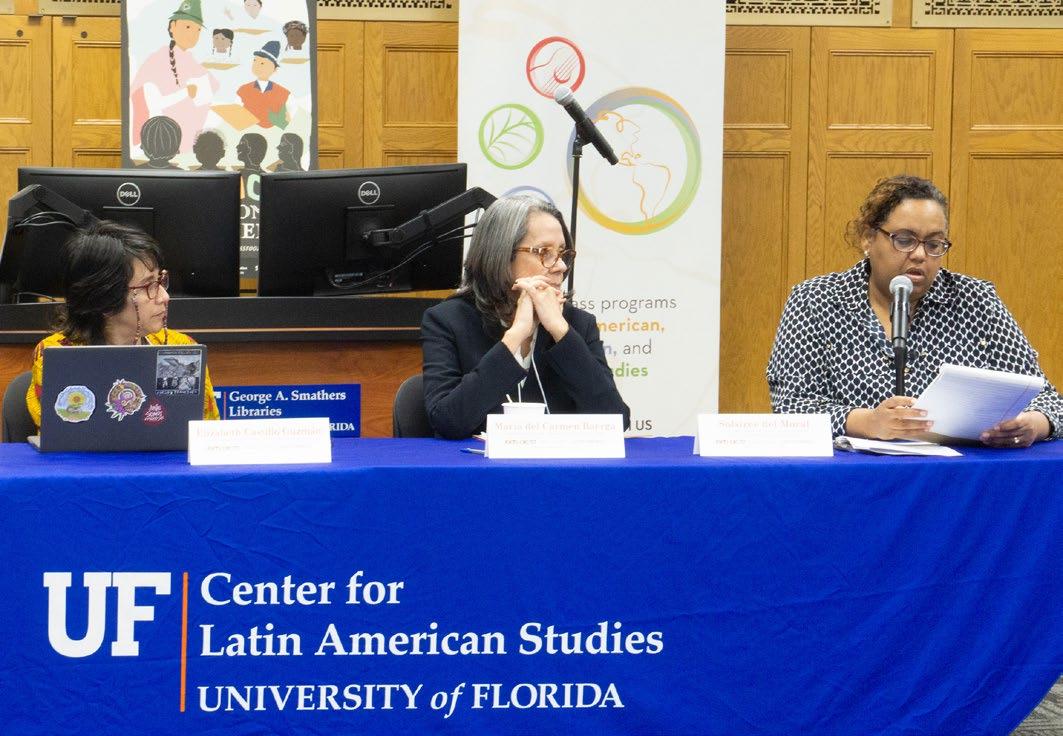
At the end of the class, I did feel out of place—but in a good way. This is the “out of place” that keeps you uncomfortable
and pushes you to sort it out. When the time was up, Solsiree took her books and water bottle and said farewell to the class, with a smile. The students smiled back. After class they shared with me that Solsiree’s class challenged them, that it made them uncomfortable in the good way, too. Some of them had discovered or confirmed why intersection was an important way of approaching these topics.
Ultimately, engaging with professors and students from different backgrounds across Latin America and the U.S. has the power to shift our understanding of our identities within our contexts. Solsiree’s presence during my MALAS experience connected me more with Puerto Rico and its often-misunderstood diasporic relationships. It made me realize I am drawn to the study of the Caribbean, even though I was trying to ignore it during my time in MALAS because I thought that it would be more productive to distance myself from the region that I experienced firsthand. And although that opened the doors to understanding phenomena in other places, at the same time, I realized that the Caribbean is not always a strong focus in Latin American Studies programs.
Reflecting on these interactions with Solsiree and her students made me think about a debate that is constantly pushed forward in Latin American Studies: who has the right to study and write about topics and themes? There are great aspiring scholars from all over the world interested in Latin America, who were not born in Latin America and the Caribbean, but whose passion and commitment to push forward research in the region is infinite. Or do they not “have the authority” to speak of direct concerns, to push forward research, to engage with topics, because they have not lived an experience firsthand? The beauty of empathy is that it is the fire that pushes toward across borders and boundaries, toward understanding and solidarity.
Communities are built by recognizing our reach and limitations when we are able to succeed and fail together. As I part now from Gainesville, with Solsiree also leaving the Center behind, I will miss her deeply. She has made me feel more comfortable continuing my studies in Latin America with a little bit of distance—which always gives perspective—and recognizing my limitations and being humble about them. ◆

Alumna Nashia Graneau (MALAS 2022 ) talks to student Maricarmen Torres Medina (MALAS 2023 ) about her thesis on the lives of Kalinago women in Dominica
BY MARICARMEN TORRES MEDINAAs I am coming to the final stage of my time here at MALAS, sitting down to reflect on our experiences as students is essential to the history of our program. Sharing the histories of our time here in Florida is not only special to us, but also brings together cohorts of past, present, and future. Just as last year, I am honored to interview the Charles Wood Thesis Award winner, Nashia Graneau, about her thesis, “Looking at Gendered Conditions, Experiences and Embodiments through the Oral Narratives of Kalinago Women.”
MARICARMEN: Could you share with me what it means to do fieldwork, especially within communities? Was it something you feel you discovered or found that you were expecting to discover throughout the experience?
NASHIA: I remember that with my research I wanted to target three generations of Kalinago women in Dominica. For me, it was easy to find women of these ages first because I was studying the community that I grew up in. The connection was very much alive. The only time I lived out of the community was when I pursued my bachelors degree and my masters degree. And right now, I live back here in Dominica with my husband and daughter. What was a little bit more difficult for me to do was to get more depth with the experiences of my participants because of what I would identify as trauma. My research required me to ask personal questions about what it was like growing up in a community like this to understand the subjects’ identities.
MARICARMEN: Your research focuses specifically on the topic of womanhood. Could you speak a little more about that? What would you say was one of the challenges in the research process?
NASHIA: I wanted to pay attention to the different things that they would do in their daily and family life. One thing I discovered during my interviews is the dynamics of care. For example, when I would go in-depth about motherhood, most of them expressed having experienced physical abuse and emotional abuse. Moreso, many of them were left to care for their children on their own, even when some of them have ten children. They were responsible for everything—cleaning the house, cooking the food, going out to find jobs, taking care
of the children. Therefore, when these topics came up in the interviews it was very emotional for many of the women. And it was very emotional for me, too, because there were some things that I never had thought about, even when I had grown up in the community. What these women shared with me were very private things. The hardest part for me is just talking through this. Sometimes I had to take multiple breaks. That was the most difficult part.
MARICARMEN: Looking back to your research and the topic of womanhood, was there something that you discovered that surprised you about gender relationships?
NASHIA: Something that was surprising to me is that regardless of the emotional and physical abuse they have been subjected to, most of them did not consider themselves victims. This was very shocking to me because when taking into consideration the definition I knew about “victimhood,” they would fit into it. For example, when they articulated their thoughts, even if they went through all the hardships, they still did not consider themselves victims. On the contrary, they consider themselves extraordinarily strong and very independent. So that was an amazing perspective. And I understood that they were reflecting upon their responsibilities within the domestic space, and valued the fact that a woman is strong to do everything they do, for example, to be able to care for ten children, to feed them, to wake up early in the morning to get them ready for school, to pick them up from school. All these things for them require strength. So, I understood through the conversations that domestic space was seen as a strength. That was a perspective I did not expect to get. After realizing this, it turned my research into another direction where I would be very conscious and careful about labeling or portraying the participants—and people in general—as victims, when those same women who overcame their struggles remarkably saw it as a strength.
MARICARMEN: This is interesting, Nashia. We are both female Caribbean students studying within the American academia. Moreover, we have been exposed to the history of feminist thought and discourses about a woman’s place within society. And sometimes in these settings, we tend to lean towards this
defense of female emancipation within professional and educational spaces, forgetting how praiseworthy the domestic space is also, in the way that feminists of the second wave also defended. How did you balance your own understanding of womanhood and what you learned in the research experience?
NASHIA: That was remarkably interesting. Myself, as a 21st century Kalingo women, for example, I do not believe that my place is in the house. And from what I saw, there is also several types of families, obviously, in the same way there is also different feminisms. Lots of them believe that women should not be restricted only to the idea of divorce, the domestic space or reduced to the care of children. However, many of the women I worked with felt that it was their place to remain in the house or to care for their children. And they did not see it as a means of oppression, but rather as a way of being strong, emancipation. They felt powerful whilst doing all of that. It is like you say, it is not directly opposite to what I have learned in school, or from my exposure to Western cultures, but it was just interesting that most women, especially those around the age of 50 to like 70, felt powerful whilst being in the house and caring for children, the household and basically caring for their husbands. And that is in kind in opposition to what we learn about women feeling more powerful, like when they go to work sites to get jobs that pay them instead of doing the jobs that they do inside of their homes.
MARICARMEN: Nashia, can you share with us what you are doing right now?
NASHIA: I am a lecturer at The Dominica State College. I lecture on history, Caribbean history, and political science.

MARICARMEN: Do you like it?
NASHIA: I love it. I love it. That is what I want to do. I want to lecture eventually at a university. But I must start somewhere! I teach young people from 16 years-old students to 30-year-old adults.
MARICARMEN: What is the thing that you love the most about lecturing?
NASHIA: The thing that I love the most about teaching is being able to share the knowledge that I have built up. Also, the possibility to teach in the local language that is common to all of us. I do not have to think all the time that I must speak “proper English” to get my point across. This is my favorite part. Being able to talk to them like we are, you know like we are on the same level, but teaching them new information.
MARICARMEN: As you graduated from MALAS last year, could you share what you liked the most about studying at the Center for Latin American Studies at the University of Florida?
NASHIA: I really love the fact that the Center tried to include everyone from diverse backgrounds, for example, the Caribbean, the U.S., and South America. I like the idea that when you bring so many people together, you get distinctive cultures and that such diversity gets to be portrayed in the activities that the Center would perform. For my cohort, it was different because our first year was online. In the second year, we finally had the
opportunity of going out and enjoy each other’s company. For my final year, I felt like a lot was invested in me because I was pregnant, and I had a lot of complications. However, professors like Dr. Martínez Novo, Dr. Paulson, and Dr. Busey really supported me, and gave me time to comply with my work while maintaining a great level of expectations.
MARICARMEN: I wanted to ask you two final questions: what you would recommend to current or future students of the MALAS program, and what message you would tell your daughter, now that you’ve conducted this research about womanhood in your community?
NASHIA: I would tell current or future MALAS students to ensure that they try to balance their social life and academic life, the academic aspect. There is a lot to experience at the Center, from all the activities offered and in Gainesville in general. Even though it is a small town, you know, there are lots of things to do. They should be able to have a balanced academic and social life. I tried to do that even when I thought I was not too successful. I wish I had gone to more events, but I was mostly focused on academia. For my daughter, well... I would recommend the same. I hope she experiences life, work, and school in a balanced way. Also, I hope she advocates for other women. I value being educated a lot because where I am from, there are not many women that could get a degree. I am very aware that I got the opportunity, contrary to my mom that did not have that opportunity. My grandmother did not have that opportunity either. Hopefully, my daughter will. I will do my best to give her an opportunity. What I want to say to her is: I am going to do my best for her to have the highest form of education. But I also want her to soak up all experiences, even the social ones.
MARICARMEN: Any final remarks?
NASHIA: Yes! I am incredibly grateful to my husband who supported me throughout my experience at the Center for Latin American Studies. Also, in the Center, I am grateful to Dr. Correia, Dr. Busey, Dr. Paulson, Dr. Risner and Dr. Martínez Novo. ◆
Smathers Libraries offer extraordinary resources in Special and Area Studies Collections
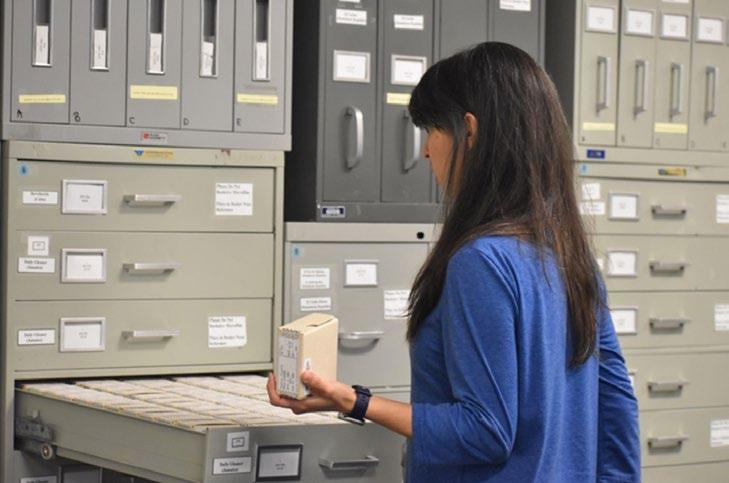

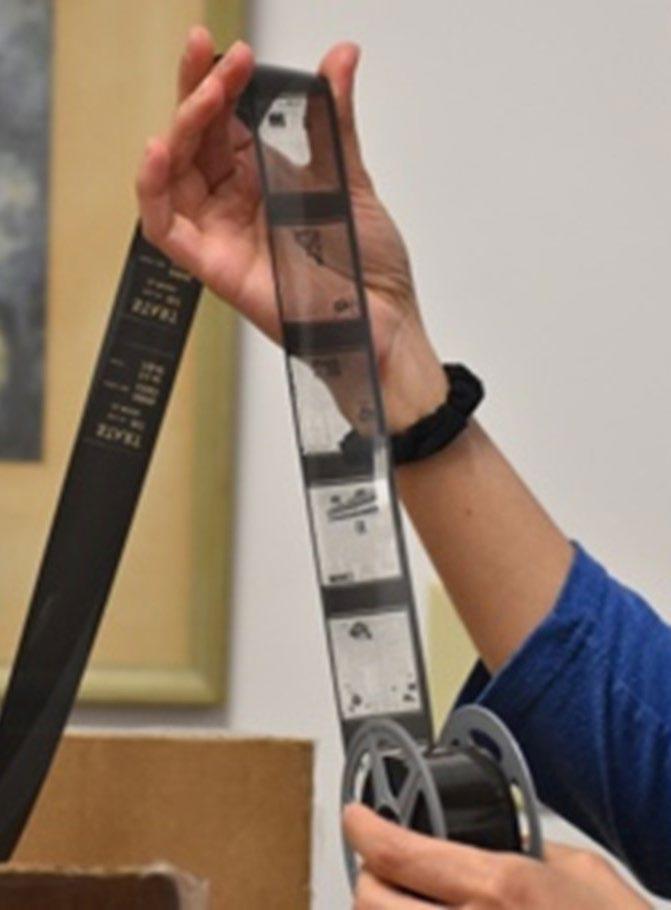
 BY MARICARMEN TORRES MEDINA
BY MARICARMEN TORRES MEDINA
If you have ever had the opportunity to visit Smathers Library at the University of Florida, you would probably agree that is a magical place. The Special and Area Studies Collections encompass the Rare Book Collection, the Map Collection, the Grand Reading Room, the Judaica Suite, the Children’s Book Collection, the Panama Canal Collection, and the Latin American & Caribbean Collection (LACC). It is a place to incentivize curiosity and creativity. It is also a place to discover new paths of research or professional development.
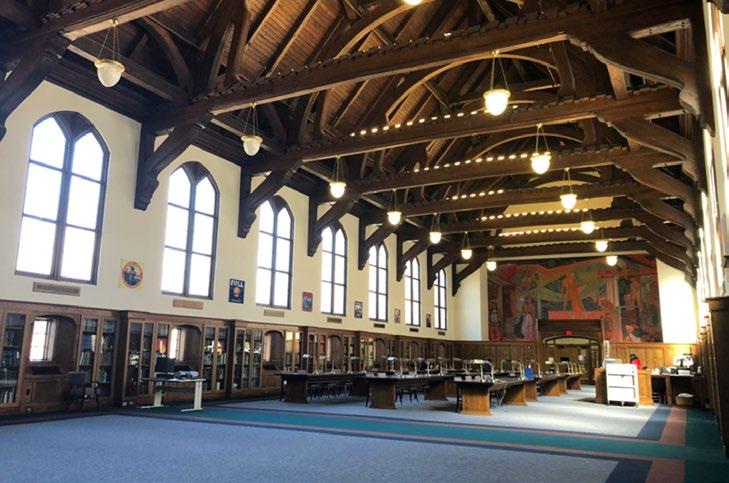
“Cultural geography” is known for exploring the relationship between spaces and time. But the concept of a “space” is not reduced to physical things or objects; it is also concerned with less tangible things like social interaction and relations. Whilst our university has great access to resources that go beyond our physical reach, experiencing the library space—whether physically or virtually—shapes our way of being a scholar, an intellectual, and our sense of community collaboration.
Throughout all my experience as a graduate student at the Center for Latin American Studies, I have been able to discover the spaces of Special Collections and engage with the collection materials. But most importantly, the Special Collections is a place where a group of committed personnel makes it possible for scholars to have the best personalized experience with the collections. My time in the MALAS program and my development as a researcher would not have been the same without the help of the Rare Book Collection’s Neil Weijer and the LACC’s Margarita Vargas-Betancourt, Melissa Jerome, and Keith Manuel, amongst others.
On the third floor of Smathers Library, visitors will find the LACC. A wide circulation desk at the entrance makes the employees look disproportionately smaller than their workstations. An unfinished puzzle at the center of the desk welcomes curious visitors. A series of small book exhibitions are placed at different points in the space. As visitors circle around the front desk, they enter the reading room (top left, above).
Sunshine filters in softly through the big arching glass windows. Students, for the most part, sit silently at the tables, glued to their computers. Light brown bookshelves contrast with the dark bluish-green printed rug that covers the floor. In the background, hidden, are the LACC curators’ offices, almost like a fish tank. What seemed so big before suddenly shrinks into four walls, isolated within the spacious room.
Melissa Jerome, the LACC Digital Initiatives Librarian, rapidly brightens the office space. “My office is messy,” she apologizes with a laugh. I sit surrounded by piles of boxes filled with microfilms of the Puerto Rican newspaper El Mundo. Colorful objects depicting nature and Cuba are displayed at her workstation. “A small remark,” Melissa forewarns. “Let’s try to be mindful of the voice volume since there are no ceilings in these boxes.” As we laugh again, one of my classmates sees me inside the fish tank and waves at us. Although Melissa’s office is stacked with material resources, her work centers on taking them out of the material and beyond constriction: into the digital world.
Before Melissa joined the LACC last year, she worked at Library West on a series of short-term grant projects financed by the National Endowment for the Humanities (NEH), mostly focusing on newspaper archival cataloging and digitization processes. For the whole eleven years she has invested at UF, she has focused on understanding her source materials—how newspapers are organized, what kinds of information they hold, what types of audience they target. Afterward, her work delves into developing new ways in which these materials can be used by the public.
This is how the digital humanities project Recetas de las Américas came to be: while working with the newspaper Diario Las Américas, Melissa discovered that this Floridabased, Spanish-language diasporic newspaper included a Latin American or Caribbean recipe in their issues. Working with a colleague in digital humanities, they created a website where around fifty recipes were included in their original Spanish as well as translated into English. The website is organized so that users can filter according to ingredients and dietary restrictions. As a future followup to this project, Melissa hopes to increase the number of recipes available, track down how some of the recipes have changed throughout time, and pinpoint the specific regions where these recipes originated.
Currently, one of her most important projects is conducting a microfilm inventory of the LACC. This will allow her to outline a working plan to prioritize the newspapers that still need to be digitized. From her experience, the Caribbean section is the strongest region of the LACC collection, and there have been concrete efforts to keep that track. Some Spanish-language newspapers are already available, like El Diario and El Mundo. Soon to be added is El Internacional, a diasporic newspaper published by tobacco workers unions, depicting the perspective of labor and featuring news about the Tampa neighborhood.
For the past ten years, the University of Florida has also established a collaborative partnership with the University of Puerto Rico to digitize several newspapers from the island such as La Gaceta and La Democracia. On top of that, a partnership with the University of Virgin Islands will allow access to some local newspapers. Looking to the future, Melissa envisions adding newspapers from Guadeloupe and Martinique to the digital collection, in order to incorporate Francophone and Anglophone territories from the Caribbean, too. This expansion means that students and scholars from the Latin American and Caribbean programs continue to rely upon the University of Florida as an important place of contact between the different geographies of the Americas.
Neil Weijer is curator of the Rare Book Collection at Smathers Libraries. I first met Neil thanks to one of my professors, and since that visit, my collaboration with Neil grew. I helped coordinate visits for scholars, and Neil helped me draw some ideas for my book exhibition, answered every question I have presented to him, and even took me to see the rare book stacks. In one of our conversations, I asked Neil what would he tell established scholars, students at UF, or outside researchers who might visit the collections thanks to the Center for Latin American Studies library travel grants (see below). What can they expect when coming to Smathers Libraries? “Whether someone is coming from across campus or across the world, we really try to work closely with them as they are planning their visit, as a way to understand their topic, the things they are interested in, and, if possible, suggest other areas of the collections that they can look into,” Neil said. Even though many researchers have one specific resource they want to see, he encourages looking at other possibilities, especially when the Special and Area Studies Collections are so expansive. “Who knows, it might be something that factors into your immediate research or that it is something you discover and return to later on.” He also pointed out that the collections are generally very accessible, allowing for a turnaround as fast as a day in some cases. Other institutions can sometimes take up to a week to pull materials.
Ultimately, the relationship between librarians and researchers at Smathers Libraries is designed to be interactive, supportive, and ongoing. “Instead of seeing people come do one thing and leave,” Neil said, “We would much rather have a conversation with them that unfolds over a long period of time.” He chuckled. “It also helps us learn what we have in our collections! We cannot know every single thing that our faculty do, or what students do. And no two people will see a book in the same way, either. So the interactions among actors in this space help us identify more uses for materials, and therefore, help us continue to find the best ways to support users.” ◆
The Center for Latin American Studies offers travel research grants for scholars at other U.S. institutions to visit UF to access the extensive resources of the LACC. Applications open in late fall, and typically close in early March, with research visits in spring and summer. Learn more and apply at bit.ly/3F6CdGY
To learn more about the newspaper digitization projects, visit ufndnp.domains.uflib.ufl.edu
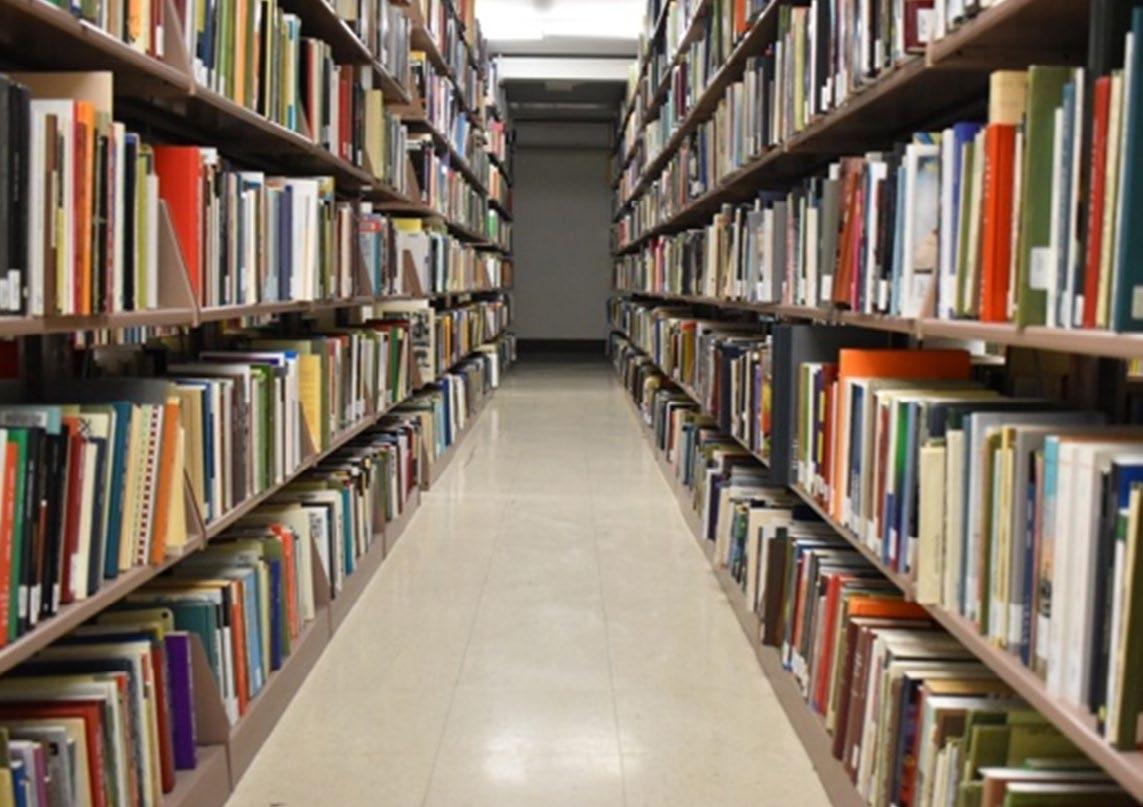
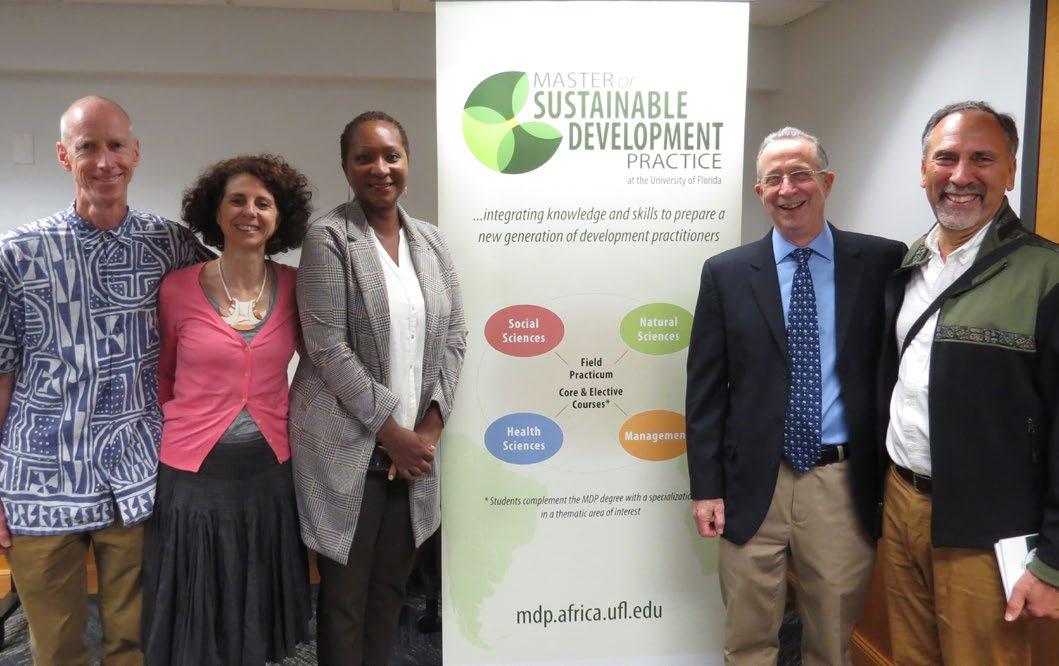
In January 2007, the John D. and Catherine T. MacArthur Foundation commissioned an international, multidisciplinary group of experts and practitioners to identify measures that might be taken to enhance the preparation of development practitioners. Do development professionals receive an adequate education to prepare them for their work? Are they well prepared to address complex, interdisciplinary challenges?
Through this analysis, the commission recommended the creation of the Master of Development Practice (MDP) Program. They envisioned a program structured around four pillars—social sciences, natural sciences, health sciences, and management—in order to nurture in students a holistic, interdisciplinary understanding of sustainable development challenges. through classroom study, participatory exercises, and field practice MDP students would develop a balanced combination of knowledge, skills, and appropriate professional behavior. Following these recommendations, the MacArthur Foundation launched a global call for proposals, encouraging universities worldwide to embark on the development of their own MDP programs. Of the approximately 85 universities that applied, ten were selected, and among them was the University of Florida.
Since then, 24 additional institutions have launched MDP programs worldwide. To date, 125 students from 25 different countries have graduated from the UF MDP program, conducting field practicums in 43 countries around the world. Glenn Galloway has served as director of UF’s MDP program since 2011, and for five years has been the North American Representative for the MDP Global Association. Dr. Galloway says that most satisfying aspects of his experience have been the generous collaboration and engagement of core, affiliate and unaffiliated faculty from 34 departments, centers and institutes; awesome students and alumni; the partners that host MDP students; and the support from the Centers of Latin American Studies and African Studies, which co-administer the MDP Program, and the International Center.
In April, the UF MDP Program celebrated its 12-year anniversary with many members of its community in attendance, including Dr. Lucia Rodriguez, the Director of the MDP Global Association; core and affiliate faculty members; the Directors of the Centers for African Studies and Latin American Studies and the International Center; as well as current students and alumni attending in-person and virtually from different parts of the world. Alumni who patched in from Indonesia, Uganda, California, Colombia, and Philadelphia shared what earning an MDP degree from UF has meant to their professional careers.
With over 12 years of existence at universities across the world, the Global MDP program has amassed nearly 7,000 graduates— and counting. As the community grows, so too do efforts to keep the community connected. A Students and Alumni Advisory Council (SAAC) was established in 2014; summit meetings for MDP leadership are held periodically to share experiences and pursue collaborative initiatives. Currently, this includes a book project (Routledge Press) entitled Transforming Education for Sustainable Development: Global Perspectives from Classroom to Practice with the participation of over 40 authors, including faculty members, alumni, students, and partners.
Celebrating UF’s 12 years of MDP is an opportunity to reflect on the program’s past and future. UF MDP students have pursued a diversity of topics in the Global North and South alike, reflecting the broadening of the sustainable development agenda since the program’s beginnings. This thematic and regional expansion is due, in part, to the 2015 United Nations Sustainable Development Goals (SDG). “The combination of the broad SDG agenda and the incredible institutional capacity of UF enables us to accommodate students with a wide range of interests,” Dr. Galloway says. The students themselves benefit from such an interdisciplinary environment in a small, tight-knit cohort:
“They may be interested in one thing, but while in the program, they are exposed to the work of their fellow students,” explains Dr. Galloway. “So, it really opens their minds—and ours—to see how these different development challenges are playing out and how fellow students get involved and contribute to the work of their host organizations in different parts of the world.” ◆
On Thursday, March 23, students, faculty, alumni, and community members gathered in the Latin American and Caribbean Collection (LACC) to attend the keynote speech of the Center’s 71st annual conference, given by Bacardi Family Eminent Scholar Solsiree Del Moral. Dr. Del Moral shared a history of anti-racist education in Puerto Rico through the story of the Cordero family and their legacy of public education for all children in the community. Over the ensuing two days, conference attendees
would learn more about anti-racist education practices and challenges in Chile, Colombia, Ecuador, Mexico, and Puerto Rico. Panel presentations and Q&A on Friday addressed issues of pedagogy, history, and policy related to intercultural bilingual education, feminism, Afro-Latinidad, and Indigenous cultural rights. On Saturday, two collaborative workshops opened discussion about Afro-Latin and Indigenous experiences in academia, as well as strategies for decolonizing education in the Americas. The
Watch past events on YouTube at bit.ly/3Er8b18 or use the QR code!
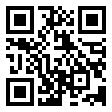
conference was organized by Center professor Carmen Martínez Novo. In addition to Solsiree Del Moral, the invited speakers were Gunther Dietz, Hugo Cerón Anaya, Luis Alberto Tuaza, Francisca de la Maza, Edmundo Hernández Amador, Zaira Rivera Casellas, José Antonio Caicedo Ortiz, Elizabeth Castillo Guzmán, and María del Carmen Baerga. The Center is especially grateful to Smathers Library and the LACC for their support in providing the spaces for this important conference to take place. ◆
• Challenges to Democracy in the Andes: Strongmen, Broken Constitutions, and Regimes in Crisis Maxwell Cameron and Grace Jaramillo˚ [9]
• Gannon Lecture: Ada Ferrer, author of Cuba: An American History Ada Ferrer˚
• 170 Years of José Martí: Examining the ‘Legacy in Stone’ with Cuban Photographer Jorge J. Perez˚
• Synergies: Reproduction and Colonialism in Latin America Paola Uparela* and Fernanda Bretones Lane*
• Indigeneity: An Historical Reflection on a Very European Idea Judith Friedlander˚ [9]
• The role of institutions for academic freedom and human rights Judith Friedlander˚ [6]
• How Did We Get to This Point? The Peruvian Political Crisis from a Latin American Perspective Cesar Castillo˚, Stephen Perz*, Richard Kernaghan*, Vanessa Luna†, Rodrigo Mezarina† [3]
• Sustainability at its Origin: Water Facilitation in Latin America Mauricio Chavarria Osorio˚
• Book launch | Crossing the Current: Aftermaths of War Along the Huallaga River Richard Kernaghan*, Abdoulaye Kane*, Mario Rufer˚, Joel Correia˚, Nancy Hunt*
• Fieldwork Festival [7]
• 71st Annual Conference | Anti-Racist Education in Latin America: Perspectives on State and Grassroots Projects [2, 8, 10]
• Publishing and the Humanities University Press of Florida
• Cuban Lukumí Bàtá: Ajúbà to Oba Ilu Ivor Miller˚
• Afro Roots Fest with Welson Tremura*, Jacaré Brazil
• Celebrating 12 years of the Master of Sustainable Development Practice Program [1]
• Global Career Opportunities: Conversations with Alumni working with Latin America and Beyond [4]
• Jacaré Brazil spring concert with Welson Tremura*
• Los Olvidados: Children, State Institutions, and Violence in Mid-century Puerto Rico COLOQUIO with Solsiree Del Moral˚
˚Guest speaker from outside institution
† Center student
*Center faculty (Core, affiliate, or visiting scholar)
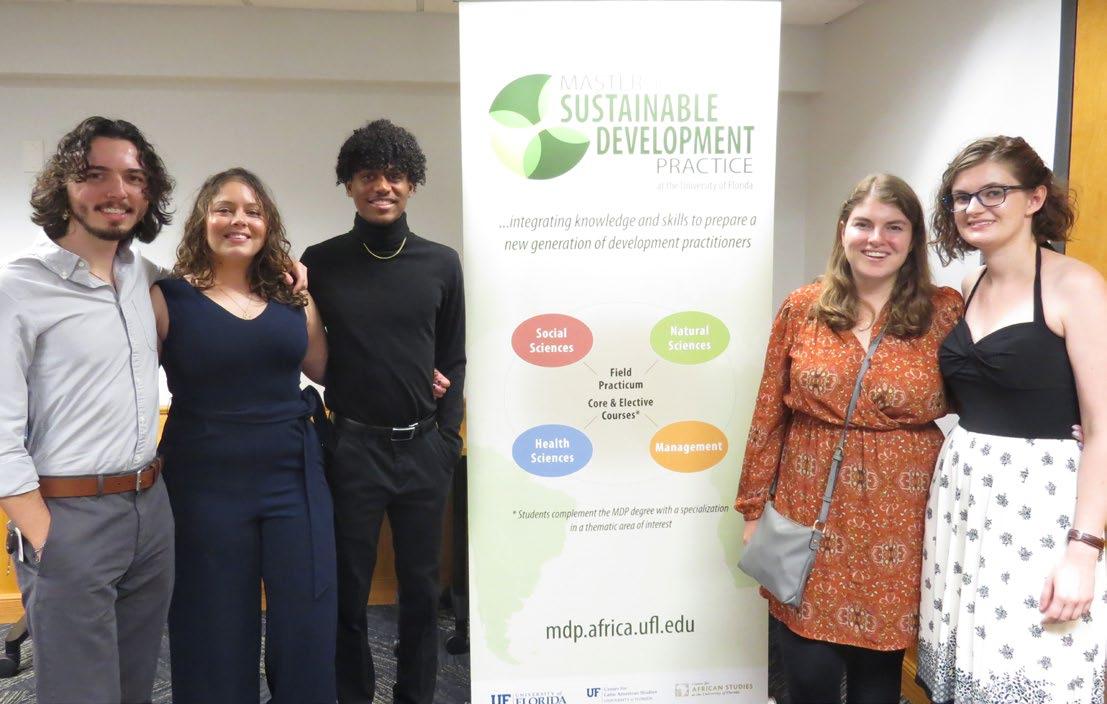
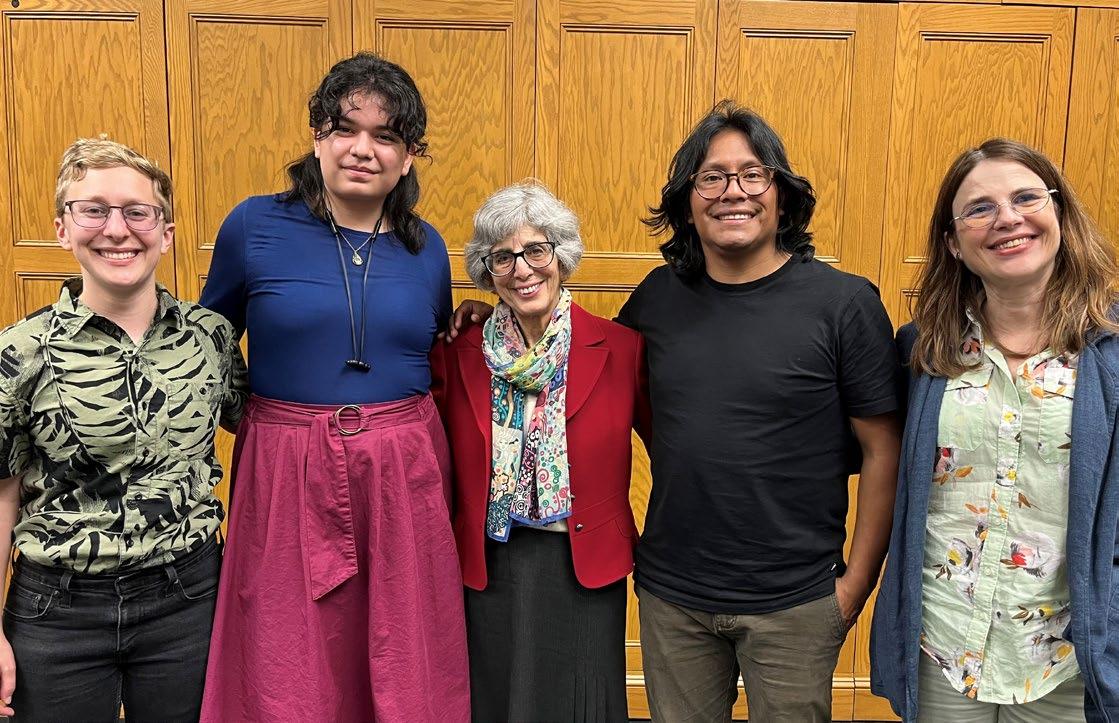
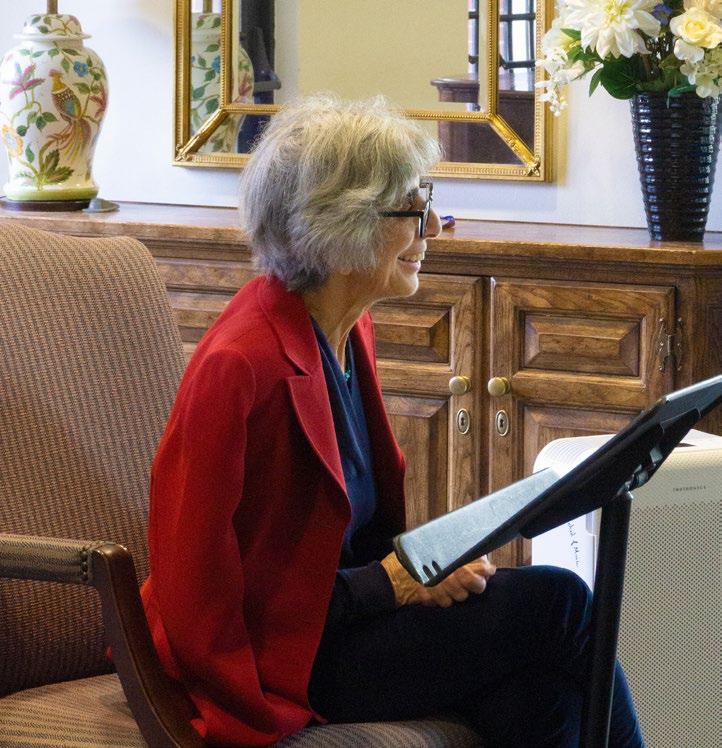
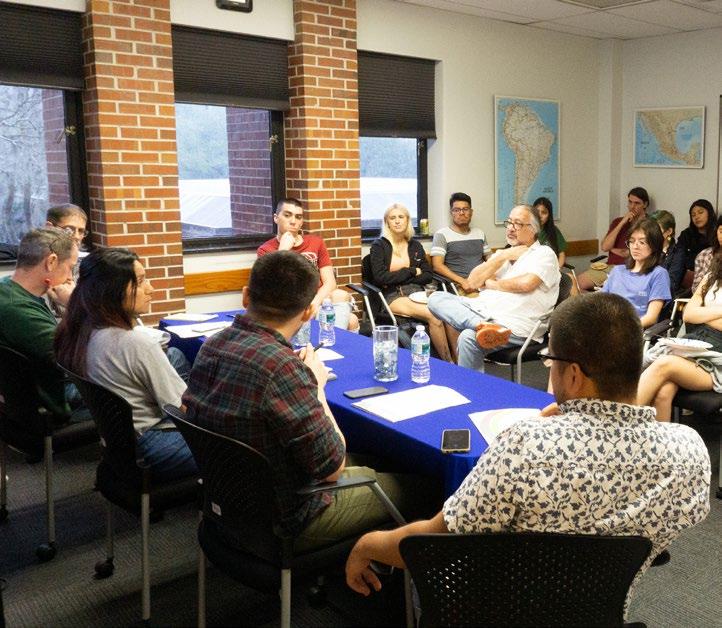


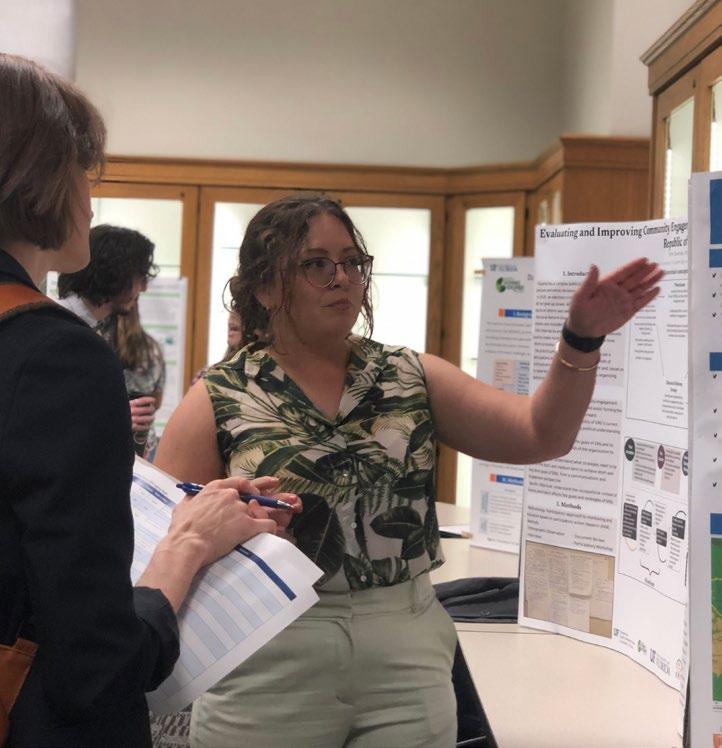
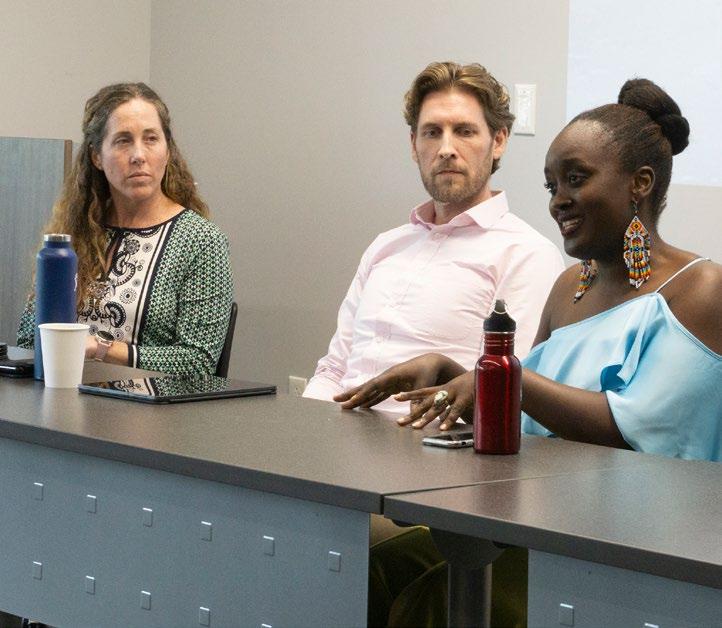
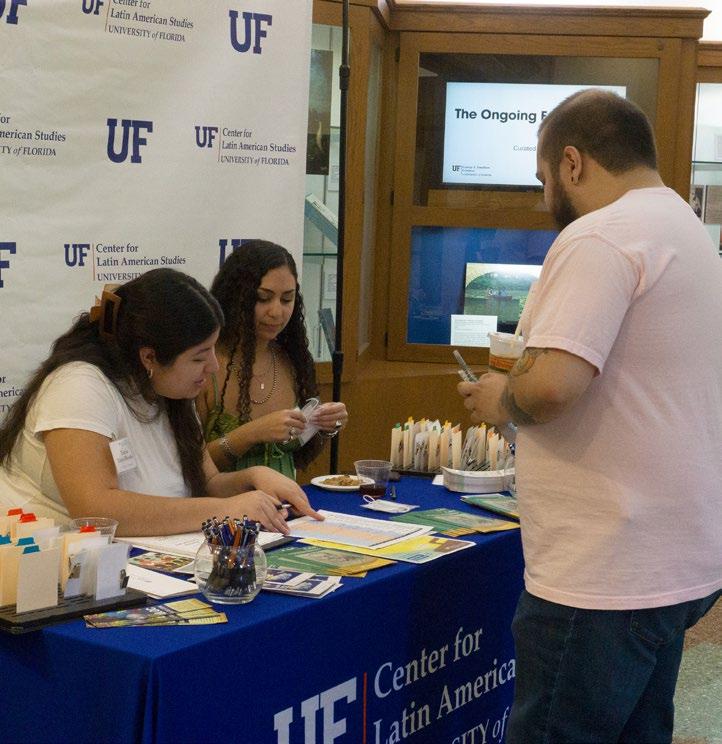
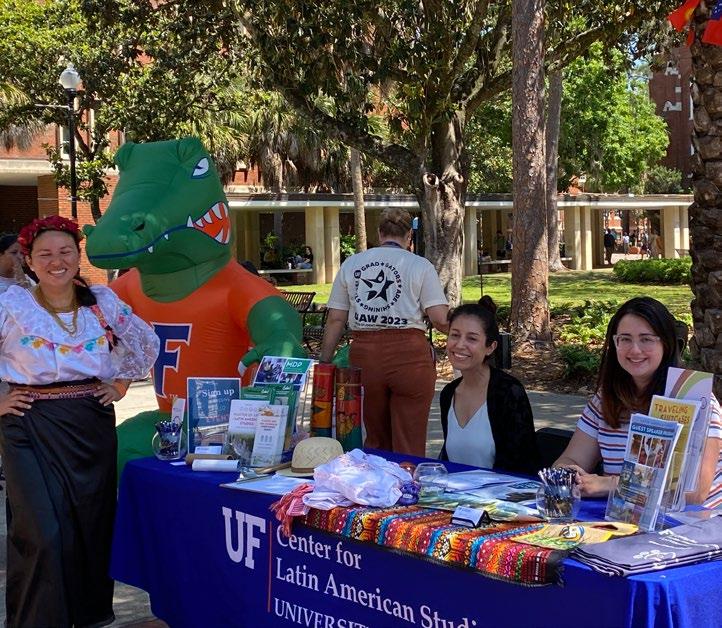

Interns in the Early Childhood Education program develop lesson plans for Traveling Suitcases and conduct them in Alachua County classroom

 BY KATY CHAPMAN AND TARA MATHIEN University of Florida College of Education
BY KATY CHAPMAN AND TARA MATHIEN University of Florida College of Education
During the Spring 2023 academic semester, 11 students in the Bachelor of Arts in Education Early Childhood Education program participated in a project where they collaborated with the Center for Latin American Studies. The students are all interns in Kindergarten through Third Grade classrooms in the Alachua County area. Each student chose a traveling suitcase to take home, reviewed the contents, and created
a lesson plan that they then conducted in their internship classrooms. This project lasted for a total of one month. At the culmination of the project, students presented their lesson plans at the Center for LAS for their peers and faculty. In addition to lesson plans, students also provided recommendations for using the materials in the suitcases for grade levels following developmentally appropriate practice. ◆


Dr. Renata Castillo from Universidad San Francisco de Quito in Ecuador visited the University of Florida this semester, sponsored by Center for Latin American Studies, the UFIC Office of Global Learning, UF International Center, the Center for Teaching Excellence, and the UF College of Education. Together with her UF collaborator, Dr. Tara Mathien, Dr. Castillo presented to UF faculty the various joint projects they have developed, including study abroad, research and presentations, and virtual exchange. Dr. Castillo also attended the Center for Latin American Studies’s 71st annual conference keynote speech, and visited P.K. Yonge Learning Community. ◆




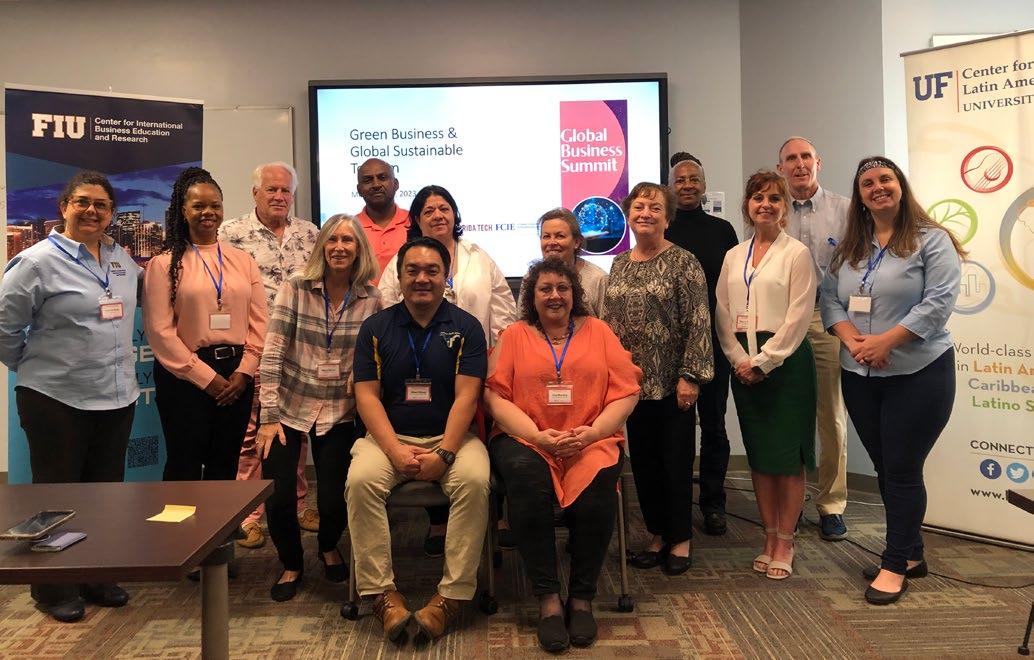
I was fortunate to participate in the 2023 Global business Summit. We came together to explore the link between Florida’s tourism industry and the global connection to hospitality, marketing, logistics, language, and culture. Importantly, how sustainability and green business efforts may affect the tourism industry.
I teach supply chain management at Broward College, and the dialogue we had with colleagues honed-in on the core issues of supply chains and sustainability concepts. More and more share- holders are requiring companies to integrate green products and processes in business operations and include sustainable processes. The issue affecting companies is keeping a balance between profits and a new focus by shareholders who are starting to require sustainable and green practice. Moreover, the younger generations are also putting market forces by changing consumer behavior towards green products and companies that have social and environmental responsibility as part of their mission statements. Younger generations are shifting away from plastics and one time use products.
The global summit afforded me the opportunity to gain knowledge from different perspectives on the impact on the tourism industry and how sustainable is the growth. Bear in mind that the global forces to go green and be sustainable are a challenge to integrate. Going green and implementing sustainable growth will require a paradigm shift in our approach to profitability and waste reduction. At this meeting, I realized the importance of including said concepts in the K-12 classrooms. It is paramount that the education begins in the K-12 classrooms.
The visit to Port Canaveral enhanced our perspectives of the green and sustainable challenges of the tourism industry and the logistical operations complexity of loading a ship with passengers, food, and drinks. It is amazing how complex the compliance for sourcing of food items is in the international tourism industry. ◆
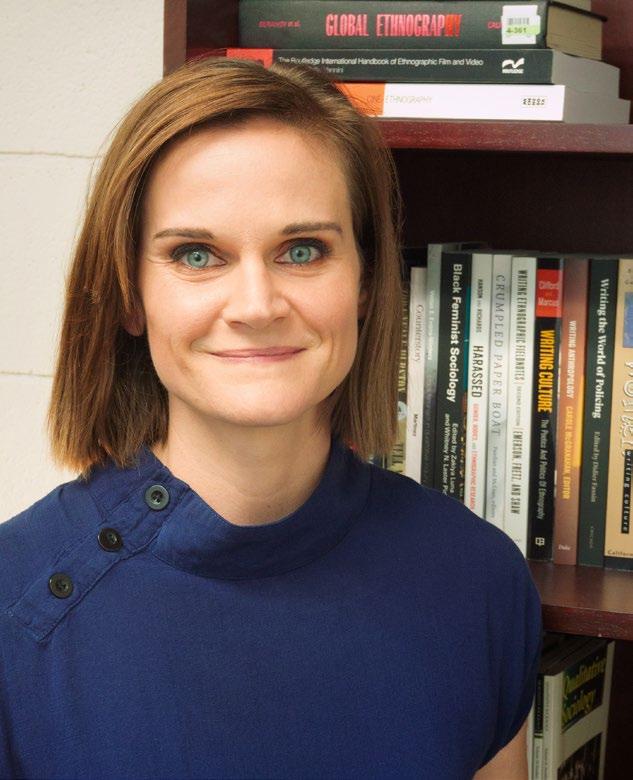
Along with co-founder Richard Kernaghan, Dr. Hanson envisions lab as a space to strengthen networks of support for pursuing ethnography
For Center professor Rebecca Hanson, conducting research isn’t meant to be a solitary practice. Rejecting the traditional image of the lone academic stooped over their work in isolation, Dr. Hanson instead seeks to affirm the reality that collaboration is intrinsic to research: “Even though ethnographers often write about their work as lone endeavors, no academic project that we engage in is solitary, ever.”
This mentality is threaded throughout the design of her most recent project, University of Florida’s International Ethnography Lab, co-founded with Center affiliate faculty Dr. Richard Kernaghan. Housed in Turlington 3323, the lab offers a space to bring together students and faculty interested in ethnographic research—from those who are actively conducting an ethnographic research project to those who are just interested in qualitative methods or ethnographic approaches more generally.
The idea was borne from the Center’s 70th Annual Conference, “Ethnographic Evidence Across the Americas,” which Dr. Hanson co-organized with Dr. Kernaghan. The conference’s four studentcentered workshops garnered such overwhelmingly positive feedback that Drs. Hanson and Kernaghan were spurred to develop a permanent space for this level of engagement with the practice and craft of ethnography.
While other ethnography labs exist at university campuses across the U.S., Drs. Hanson and Kernaghan sought to set UF apart by centering their lab around a strong international focus. “There are a lot of challenges that are exacerbated or made particularly difficult when you’re doing research in international contexts,” explains Dr. Hanson, whose own research takes place primarily in Venezuela. “We want to provide resources beyond what traditional methods classes can offer, like additional training and support so that researchers are more prepared in the field. We want to have conversations about how to survive and thrive doing research in a way that’s healthy for the researcher and research participants.”
Dr. Hanson’s vision for the lab orbits the firm rejection of research as something that scholars conduct alone. This community of support is designed to endure even throughout the most critical step in the process: during the fieldwork itself. “That’s something that is really, really missing from conversations on fieldwork,” emphasizes Dr. Hanson. To achieve this mission, the lab is equipped with hybrid technology that allows researchers in the field to participate in lab activities remotely.
Hybrid technology also means that the lab encourages participation and exchange from researchers at other institutions across the world, strengthening global networks collaborating on ethnography, both at universities and organizations beyond academia. Dr. Hanson hopes that students and faculty will lean on these international, interdisciplinary linkages to make their research stronger and their research experience better. “One thing I really encourage students to do to the degree that they can when they’re doing international field work is to try to build some kind of network for themselves in the space where they’re doing research so that they have support.”
That kind of support might just begin in the Ethnography Lab itself. Students and faculty are encouraged to stop by the lab to explore the “Qualitative Library,” which houses books and resources on qualitative methods, including guidelines for how to write a qualitative methods research proposal. “You can come into the space, use the resources, drink some tea,” Dr. Hanson suggests. Those who want to engage more actively with the lab can reach out to Dr. Hanson and become a member. Workshops are already planned for the fall, and Drs. Hanson and Kernaghan invite participation not only in these activities but also on how the lab can best serve its community. Driven by his own passion for ethnography, Center professor Clate Korsant has joined them for discussions on the lab’s long-term goals.
Looking ahead, the team plans to develop an ethnography certificate program for undergraduate and graduate students alike. They also hope to offer funding for students conducting ethnographic and qualitative research—something particularly meaningful for supporting international students, Dr. Hanson says. “If we’re going to continue to do what I consider a really important method of research, specifically for our students from Latin America, we need to find ways to remove some of the barriers that make it difficult.”
Perhaps, then, within the networks that the International Ethnography Lab brings together, the myth of the lone researcher will fade completely, replaced with the lived example of a global collaborative academia made practice. ◆
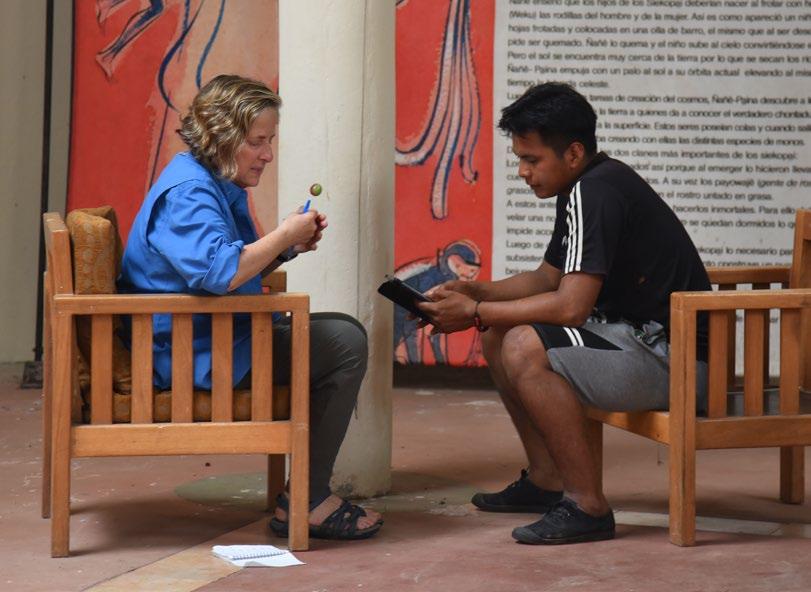
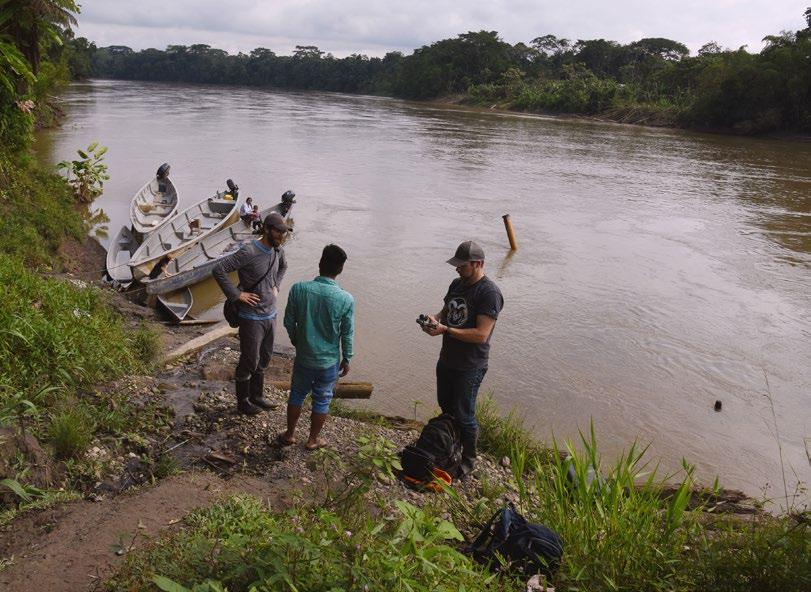
On the copper-colored waters of the Aguarico River in northeast Ecuador, a dugout canoe motors against the current, just departed from the remote Siekopai community Remolino after a research visit with its residents. Not ten minutes into the hour-long journey, the skies burst open and lash down curtains of rain. Before long, the drenched team has to stop and bail out water before they can continue—the first of two such interruptions. “We took it in stride,” laughs Center affiliate professor Cynthia Simmons (Geography), three weeks after returning to Gainesville. “It’s the wettest part of the Amazon, so it’s not a surprise.”
Along with Colorado State University professor Joel Correia, Dr. Simmons spent two weeks in the region as a part of their NSF-funded research project to study Indigenous socioenvironmental systems there. The team is led by Principal Investigator and Center professor Robert Walker; along with Drs. Simmons and Correia, Center affiliate professor Miguel Acevedo (Wildlife Ecology and Conservation) and Princeton University researcher Michael Esbach (PhD, University of Florida) are CoPrincipal Investigators.
During this latest field visit, Drs. Simmons and Correia met with communities along the shores of the Aguarico to train local representatives on a social science survey that they will use to conduct interviews with community members after the U.S. researchers leave. The results of these surveys will then be synthesized with ecological data collected by the team as part of their integrated, transdisciplinary research design. “Our approach draws from the concept of biocultural heritage, which views the relationship between the social and ecological as intimately integrated,” explains Dr. Correia. “But that relationship isn’t binary; rather, it’s a web of dynamic systems and processes that are embedded within broader political and economic forces, too.”
By collecting both social and ecological data, the researchers seek to reach a more nuanced and complex understanding
of how these systems interact with one another, especially in the larger context of encroaching extractive development that threatens the biocultural heritage of these communities. “The complexity of the questions and problems and dynamics that we’re investigating—and that people are navigating in their daily life—requires a complex approach,” Dr. Correia. “Having a team of people bridging the boundaries of their disciplines is a necessity.”
Integrating social science with environmental research points to another crucial feature of the project: working with Indigenous communities on equal terms as respected partners, not research subjects. Before the trainings even began, the surveys were workshopped with community members, to ensure that the questions respond to their interests and are culturally appropriate. They were then carefully translated into the different local languages—a collaborative process that took several days. At all stages of the project, the activities are designed to build Indigenous research capacity.
Both Drs. Simmons and Correia emphasize that this type of fieldwork is only possible because of years of relationship development—in this case, thanks in large part to the trust built by co-investigator Michael Esbach during his years of research in the area. “Many Indigenous communities are understandably very hesitant to receive researchers, especially when the projects don’t offer any benefit to them,” Dr. Simmons explains. “Michael’s work has been profound in fostering trust in this project.”
To ensure one particular benefit for the Siekopai, Sinangoe, Siona, and Zabalo communities participating in the project, the U.S. team collaborated with them to create data sovereignty agreements, by which they have full access to the data the project generates and how that data is used or published in the future. This model facilitates a larger purpose for the project: to identify and support strategies for community-led conservation in the future. “Our work has the potential ▶ cont’d on p. 19
Center funds cover the cost of travel and fees for Luísa Bridi Dacroce (MALAS ‘23 ), Laura Botero (MALAS ‘24 ), Rodrigo Mezarina (MALAS ‘24 ), and Daniel Sarkela (MALAS ‘24 )
While students might be motivated to attend or even present at academic conferences, costs like registration fees and travel expenses can be prohibitive. But thanks to the Safa Graduate Student Travel Endowment, seven Center students were able to present their research at conferences this spring.
Of the seven, four are pursuing MALAS degrees: Luísa Bridi Dacroce (MALAS 2023), Laura Botero (MALAS 2024), Rodrigo Mezarina (MALAS 2024), and Daniel Sarkela (MALAS 2024, and all four reported the benefits of their experience:
Only a few months from graduation, Luísa was particularly interested in the opportunity to hone her presentation skills. “I was very thankful to take advantage of the endowment,” says Luísa. “It’s important practice because I want to work in academia, and I need to get used to doing these kinds of presentations.” Luísa traveled to Athens, Georgia for the 26th Annual Conference on the Americas, where she presented a portion of her thesis research, titled “Unraveling (Luso) Latinidad: Children of Brazilian Immigrants’ Racial(ized) Experiences in the U.S.”
Before the conference, Luísa felt somewhat daunted by speaking in front of an audience of unknown scholars. “It was a little scary,” she says. “I was concerned that nobody would understand or care, and they’d ask questions I wouldn’t be able to answer.” Her experience was, in fact, the opposite. The audience at Luísa’s presentation was engaged and inquisitive, flooding her with questions, all of which she answered easily. “It was actually so pleasant that people seemed to respond to this topic in that way.”
Daniel echoed the importance of practicing presentation skills, not just to grow confidence but also his CV. “It’s a great resume builder,” he said about presenting at the Southeastern Council of Latin American Studies in Antigua, Guatemala. “That experience helps my professional growth as an academic and also advances my marketable skills for future jobs.”
For the first year MALAS students, presenting their research in progress is a great way to reflect on their approaches, either through the process of developing the presentation, or by getting input from other conference attendees. Laura’s experience
presenting on Indigenous rights in the Venezuelan Amazon offered new perspectives from each. “I’ve been struggling with how to present both the social dimension and the environmental dimension of my research,” she explains. “They’re inseparable, both perspectives are important, but it’s challenging to integrate data analysis with ethnographic methods.” By reconfiguring her research into a visual presentation, Laura realized her field photography might serve a useful role in resolving her challenge. There’s also the chance to learn from similar research, through keynote speeches and attending other presentations. “I got to see a panel with three Indigenous activists from other countries in Latin America, which was amazing,” Laura shares. “I learned about their grassroots political efforts and how they’re involved in constitutional reform, and it gave me a new perspective for thinking about Indigenous issues in Venezuela.”
The opportunity to get new input can set a scholar on a different path, reinvigorated to keep going. “It helps to improve my investigation, and I also feel more motivated to continue my research,” says Rodrigo, who presented on Venezuelan migration to Lima, Peru at the 57th annual Southwest Council of Latin American Studies conference in Dallas, Texas.
Conferences also afford any scholar the chance to step into new spaces and learn from other disciplines completely unrelated to their own. “For me it’s important to get out of your normal environment and meet new people,” reflects Laura, who attended a presentation on literature for something different to her own studies. “It can be important for interdisciplinary knowledge but also our wellbeing.”
Luísa had a similar approach – she herself attended a presentation on economics that she says she never would have gone to in the day-to-day routines of classes and schoolwork. “It’s
Luísa, Laura, Rodrigo, and Daniel were able to present at conferences thanks to donations to the Safa Graduate Student Travel Endowment. Helen Safa was the first woman to serve as director of the Center, and was also president of the Latin American Studies Association. If you’d like to support the professional development of young scholars like Luísa, Laura, Rodrigo, and Daniel, you can donate to the Safa Graduate Student Travel Endowment here : go.ufl.edu/las-sgste
always interesting to see what’s going on in other fields,” she says. There’s also value in seeing what other graduate students are doing, and topics you might never have considered. “I attended a whole presentation about a podcast. I didn’t even know you could present a podcast at a conference,” says Luísa.
Conferences also offer positive feedback, which can come in many forms. For Luísa, it was the professor who approached her after her presentation to tell her how glad he was to see her research, because the experiences of the Brazilian diaspora are not often included in studies on Latinx migration. “It made me feel validated, that I’m giving this work more visibility and that it can contribute with other experiences,” Luísa reflects.
There is also positive feedback in the form of conference awards. Before attending the conference, Laura submitted her ethnographic essay to the graduate student paper competition, and it ended up receiving honorable mention. “It was really special because the other two winners were older than me, like masters students in their last semester,” Laura shares. She also received a cash prize for the honor.
Bringing academic work to a wider audience means that students can broaden their networks beyond their home university. Coming in contact with likeminded scholars pursuing similar research can foster collaborations for the future. Daniel highlights the value for him to connect with other music researchers who work in different disciplines, like Utopian Studies and Literary Studies; Rodrigo points out that this kind of networking can be helpful in applying to PhD programs, too.

For these young scholars, it is also meaningful to present research at conferences on topics that are often less visible, like Laura’s investigation in the Venezuela’s Amazonian region, Daniel’s study of the musical language used in protest songs, and Luísa’s focus on the Brazilian experience in U.S. Latinx diaspora. “Before my research, I found about three articles on the Brazilian diaspora,” Luísa says. “So for me personally, I’m motivated to give more of a spotlight to that community and amplify the narratives that the participants shared with me.”

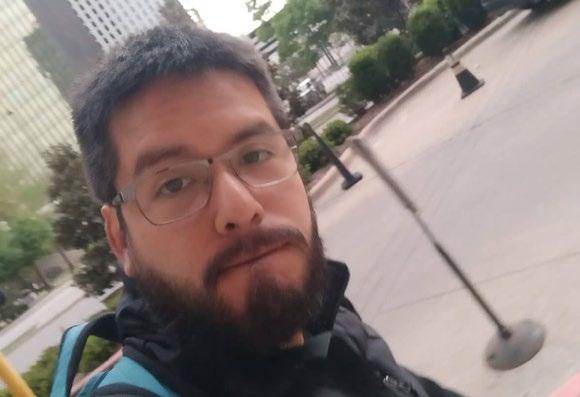
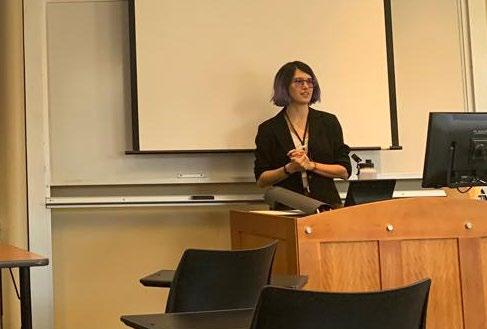
to demonstrate that there really is that connection between Indigenous cultures and their environment, which may be able to support their claims to territory,” Dr. Simmons explains. With Indigenous communities across Latin America under threat, whether by road construction, monoculture farming, oil extraction, or wildlife poachers, resources like legal evidence or early warning about harmful developments may be vital in the keeping their territory intact.
Going forward, the team will continue periodic field visits to work with the
community partners and collect data. The next stages of the project will involve Dr. Acevedo leading the analysis of ecological data and Dr. Walker integrating the findings in order to test hypotheses about the sustainability of Indigenous Territories.
This field trip complete, Drs. Simmons and Correia underscore the importance of going to the field sites and interacting with the communities firsthand. Even with the soaking rainstorm, both of them cited the excursion to Remolino as their favorite activity on the trip.
“The community was so excited to have
us there, and so incredibly generous,” says Dr. Simmons. “It was such a great experience, creating that bond.”
“For me, research is always about interpersonal relationships,” Dr. Correia notes. “At the end of the day, the most important facet of this work is that it supports communities and their goals, because they’re the ones living in these contexts and confronting these challenges after we leave. So every trip, it’s about deepening relationships, spending time with people, and trying to use the tools we have at our disposal to meet those challenges.”
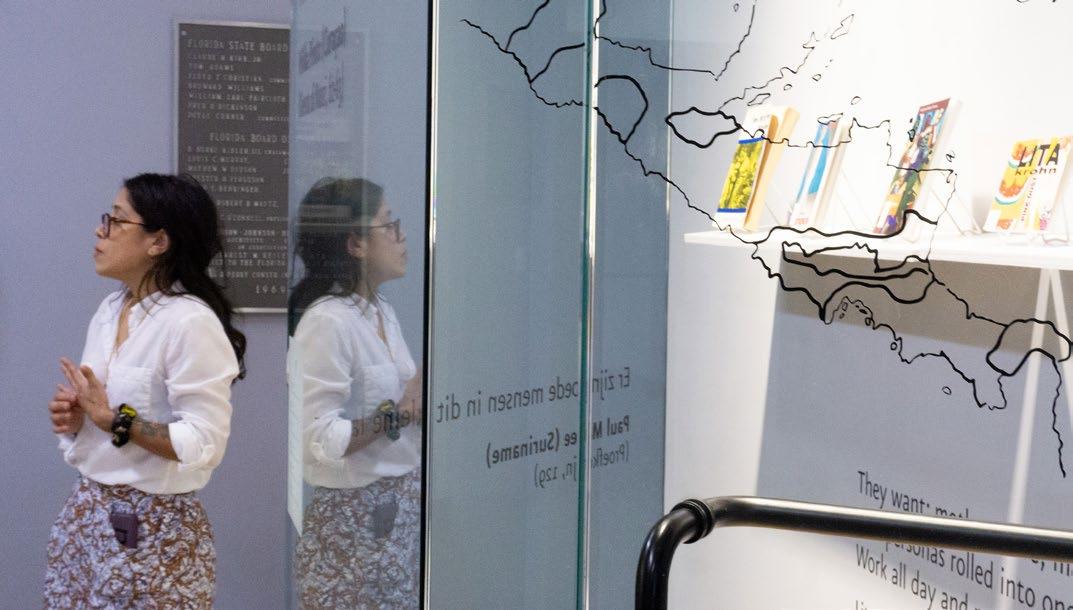
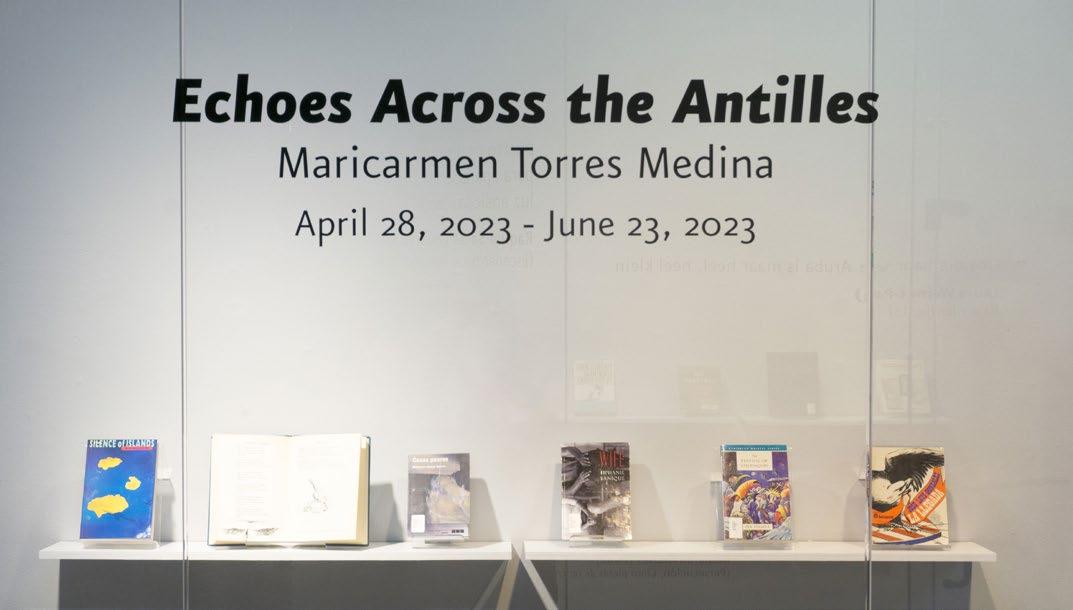
Maricarmen Torres Medina (MALAS 2023 ) seeks to broaden conceptions of Caribbean
MALAS 2023 graduate Maricarmen
Torres Medina has curated the exhibit “Echoes Across the Antilles,” on display in the Grinter Gallery from April 28 until June 23. Working with Center affiliate faculty Jesús Fuenmayor, she developed the exhibit as part of the requirements to earn a graduate certificate in Curatorial Studies from the School of Art+Art History.
“Echoes Across the Antilles” is a culmination of Maricarmen’s intellectual journey at the Center for Latin American Studies, synthesizing her passion for the written word, curated collections, and Caribbean Studies. Pulling from the riches of the Smathers Library’s Latin American and Caribbean Collection, Maricarmen
selected 24 works of writing from authors across the Caribbean and organized them by theme: geography, history, and bodies. They are presented in the gallery alongside excerpted quotes that provoke reflection on Caribbean identity, in English, Spanish, French, Haitian Creole, and Papamientu. Maricarmen positions the quotes next to, behind, and even in front of the books, physically integrating the concepts that thread through time, place, and genre.
Through this exhibit, Maricarmen encourages the visitor to reconsider their conception of the Caribbean and its peoples through the literary and intellectual work by them—perhaps even moving the viewer to check out
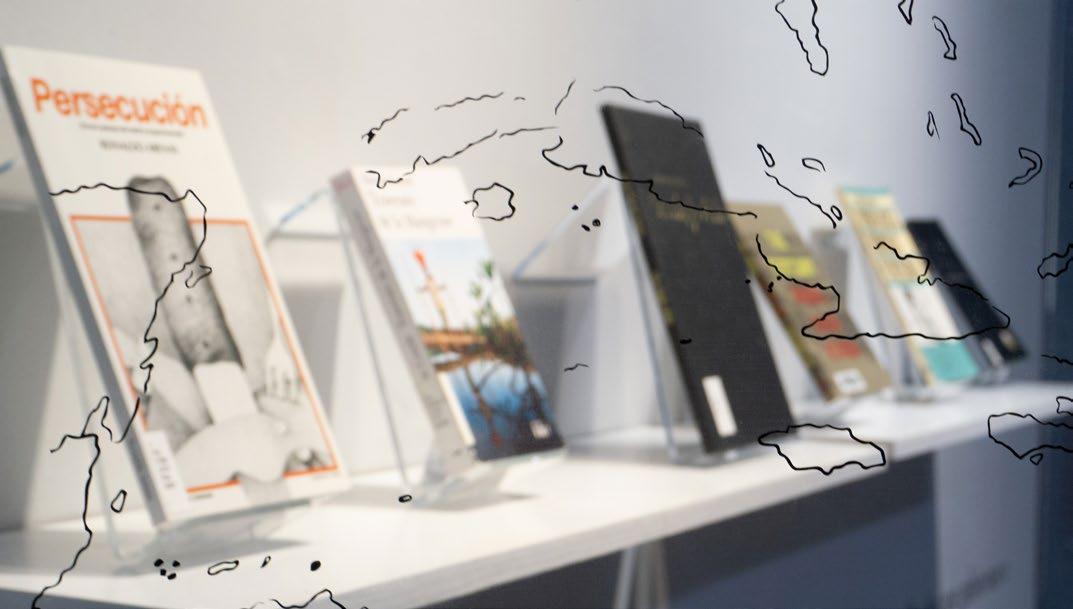
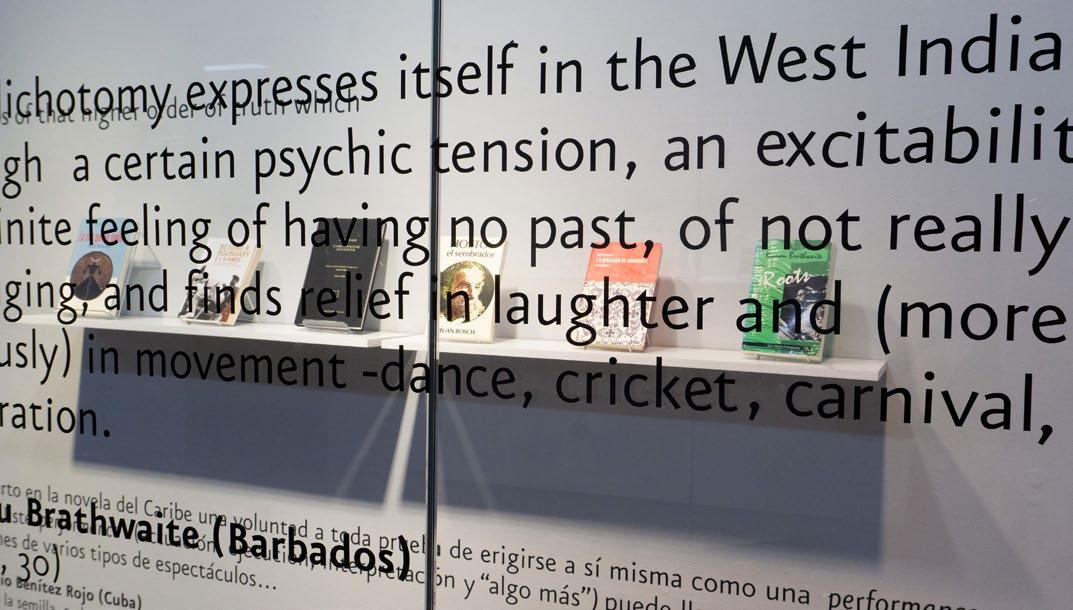
one of the books from the library and reading more for themselves. “This exhibition invites us to relink, relate, and question our notions about the written work, and the region,” she writes in her artist’s statement. “Just as ‘echoes’ move, reverberate, and break silences, this book exhibition is a call to imagine the Antilles —and ourselves— through sensitivity.”
Eighteen different territories are represented in the exhibition: Cuba, Puerto Rico, Dominican Republic, Haiti, Jamaica, Barbados, Trinidad and Tobago, Aruba, Martinique, Guadeloupe, Barbados, Nicaragua, British Guyana, Belize, Suriname, Curaçao, Jamaica, Colombia. ◆
Building on 20 + years of experience in non-profit cultural organizations, Ivy explores a public space’s role in education and community
Who are museums for? This question is one that Ivy Chen (MALAS 2024) thinks about often, as she pursues graduate degrees in Museum Studies and Latin American Studies. Ivy herself feels at home in museums, having grown up regularly visiting them on family trips and weekend excursions.

“A statistic that gets quoted often in arts administration is that museums are seen by the general public as the most trusted places for information,” Ivy explains. “But we forget that museums are incredibly curated spaces.” In adulthood, she found herself on the other side of this information dynamic, as her professional path brought her to arts administration after a B.A. in Asian Studies and an Artist Diploma in Cello Performance at The Boston Conservatory. In her ensuing career, she amassed over 20 years of experience working at non-profit cultural organizations, including eight years at University of Florida’s Harn Museum of Art.
“Even when I worked at a museum, I didn’t fully appreciate how much power museums have,” Ivy says. “There’s no possibility to tell all the stories available, and that means that choices are made. So, whose stories are not being told? Who doesn’t feel welcome in museums, because they don’t feel their culture or community is represented accurately, or even at all?”
Putting her professional career on pause has afforded Ivy the opportunity to learn more about and reflect on these questions through her studies. Thanks to Dr. Nicholas Vargas’s class Race and Latinxs, Ivy found her way to Latin American Studies and her thesis research project on the Spanish colonial fort Castillo de San Marcos in St. Augustine, Florida. The fort’s origins tell a story of intersecting cultures in early U.S. history: it was constructed in 1695, by free and enslaved Africans as well as Indigenous peoples, to protect Spain’s Atlantic trade against the British and French. The settlement also infringed on Timucua peoples. Today, it’s a popular tourist attraction. Before the
pandemic, the Castillo was welcoming approximately 650,000 visitors annually—Ivy was even a chaperone on her daughter’s fourth grade field trip there, a rite of passage for all Florida public school students.
Of particular interest to Ivy is that the Castillo is promoted as an American Latino Heritage Site by the U.S. National Parks Service. “Normally when we think of national parks, we think of places that are preserving beautiful wilderness landscapes,” Ivy explains. “They are also spaces that create an idea of what America is.” But is the Castillo similar for Latino Americans? How does it portray an American identity? Do Hispanic and Latinx American visitors feel a sense of national belonging at the site? These are the questions that Ivy will explore during her fieldwork at the Castillo in the summer of 2023.
Delving into these concepts is a culmination of personal and professional interests for Ivy. One thread traces all the way back to her childhood in Boston—a city whose landmarks tell a story of English colonies and the first sparks of revolt that would lead to U.S. nationhood. There are, too, her own personal reflections on American identity as the daughter of immigrants to the U.S., as well as her motivation to foster community engagement in arts spaces. Her last project at the Harn was the Composers-in-Residence program, which brought UF PhD music composition students to the museum to write a piece of music inspired by an artwork in the collection. “I just thought, what’s a way to connect with people who are more musical and auditory and might not visit an art museum? I always want to connect with visitors in different ways,” Ivy says. She points out that every visitor comes in with their own experiences, and there’s no way to know what they’re going to take away from their visit. But this only affirms her drive to open up museums for different audiences. “That’s part of why I’m doing this research. I want to learn more about this community that the Castillo is trying to engage with, because that’s important. You have to know what that community thinks and how they feel.”
For Ivy, pursuing two graduate degrees mid-career means that she’ll return to her professional endeavors with more qualification for leadership positions in arts administration. More than that, she’ll have the results of a unique opportunity to explore new dimensions of her chosen field: “I feel really thankful that I’ve had this chance to come back to school and have the time to really read and engage and think more deeply about these issues.” ◆
If you’ve visited the Center for Latin American Studies on the third floor of Grinter Hall, chances are you were greeted by a large colorful graphic on the wall in the lobby. For years, this image was used as the Center’s logo, starting in the late 1990s until a redesign in 2013. But little was known about the origins of this logo. Who created it, and what does it depict?
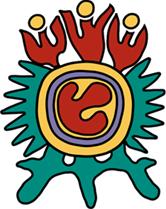
These questions were finally answered by anthropologist and professor emerita of the University of Central Florida, Dr. Allyn MacLean Stearman. Dr. Stearman was able to provide a wealth of information about the image, because she herself created it.
Although this graphic was used as the Center’s logo in the late 1990s, its first appearance was actually a quarter of a century earlier, on a book display advertising recent publications in Latin American Studies by the University of Florida Press. It was 1973, Grinter Hall was newly finished, and Allyn Stearman was pursuing postgraduate degrees in anthropology at the University of Florida after living in Bolivia as a Peace Corps Volunteer.
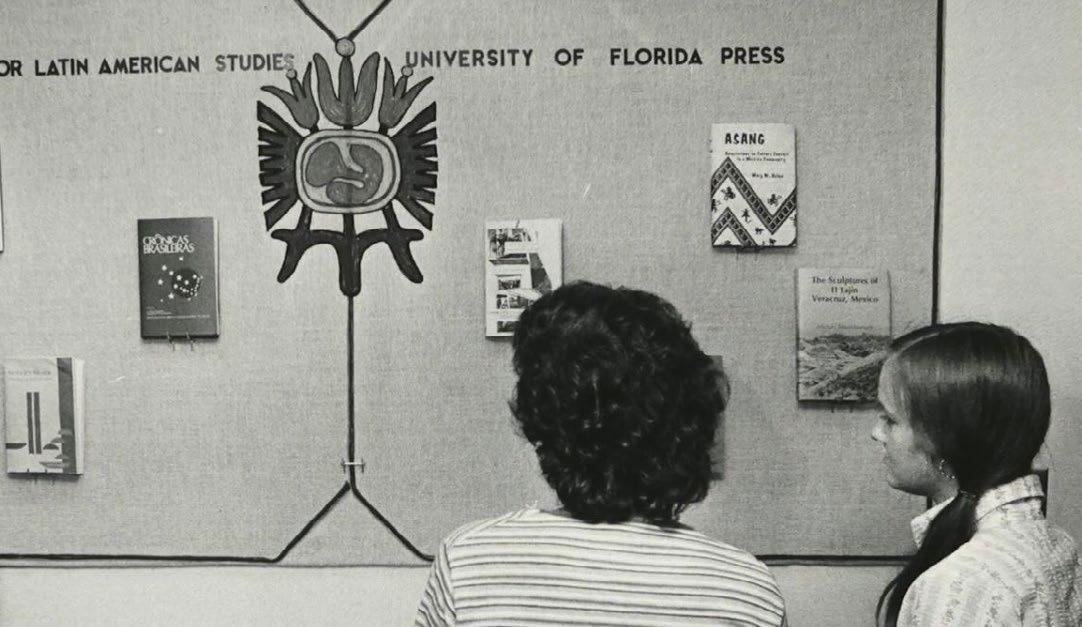
“I originally produced the design as a decorative element for the book display board because it was an unattractive eyesore in the Center for Latin American Studies office,” Dr. Stearman shares. “As an artist, I offered to develop a plan to improve the situation.”
Her design stemmed from her interest in Indigenous cultures of Bolivia: “I adapted my drawing from an old Andean ceramic or textile pattern. What caught my attention were three flowers at the top with their stems at the bottom, which I interpreted in the
design as Kantutas (Cantua buxifolia). They are considered a sacred flower of the Incas and became a national floral emblem of Bolivia because their three colors [red, green, and yellow] reflect those of the Bolivian flag.”
Dr. Stearman’s homage to Indigenous art carried through into her methods for applying the image to the bulletin board. After covering the board with light burlap fabric, she lined up colored strands of knitting wool and glued them to the burlap, creating a textured image that evoked Andean weavings.
Allyn Stearman graduated from UF in 1976 with her PhD in anthropology and no idea that her design would one day be used to represent the entirety of the Center for Latin American Studies. “I have always been gratified that I was able to make some small, lasting contribution to the program, which supported me in all possible ways, and enabled me to become an anthropologist.” ◆
Center’s bust becomes #67 in Martí portfolio by Cuban photographer Jorge J. Pérez
Since 2017, Cuban photographer Jorge J. Pérez has made it his mission to photograph every monument to Cuban national hero José Martí across the diaspora in the United States. So sprawling is Martí’s legend that statues in his honor are dotted all across the U.S., revealing sometimes hidden connections with Cuba.
The bust of José Martí on display in the Center’s lobby was gifted to the University of Florida in 1950, representative of the early ties between Cuba and the university’s Institute of
Inter-American Affairs. This particular bust is one of several casts made by the famed Cuban artist Juan José Sicre in the process of creating the Martí monument that still stands in Havana’s Plaza de la Revolución today.
Coinciding with the 170th anniversary of José Martí’s birth, the Center hosted Mr. Pérez to photograph our storied bust and add it to his portfolio. It joins a collection of portraits that tell a larger story of a diaspora, connection, and reverence for a national icon even on foreign soil.
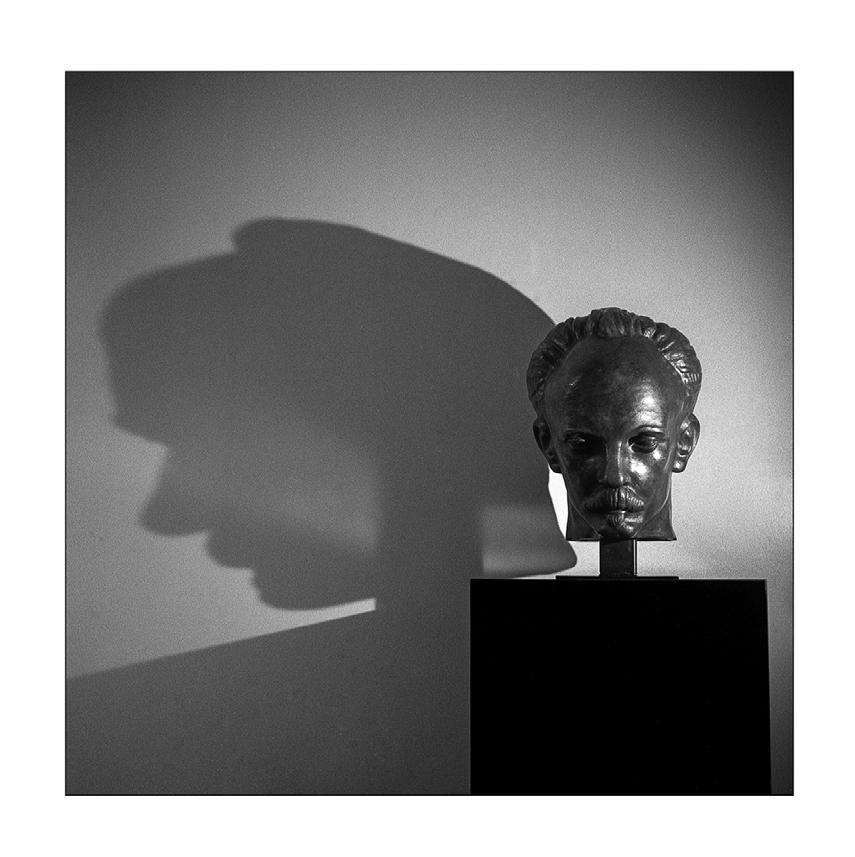
Judith Anderson (LAS certificate 2010 ), Meghan Reynolds (MALAS 2006 ), and Jacob Schultz (MALAS 2007 ) shared expertise from academia, business, and government experience
For many students, the transition from attending university to embarking on a career can be abrupt and overwhelming, like taking a leap off a tall cliff into unknown waters. Preparing for these early professional endeavors with so little experience leaves students scrambling for resources that can help them.
In April of 2023, three Center for Latin American Studies alumni returned to their alma mater to offer the most invaluable kind of resource to current students facing the transition to a career: the expertise of people who have walked the same path before them.
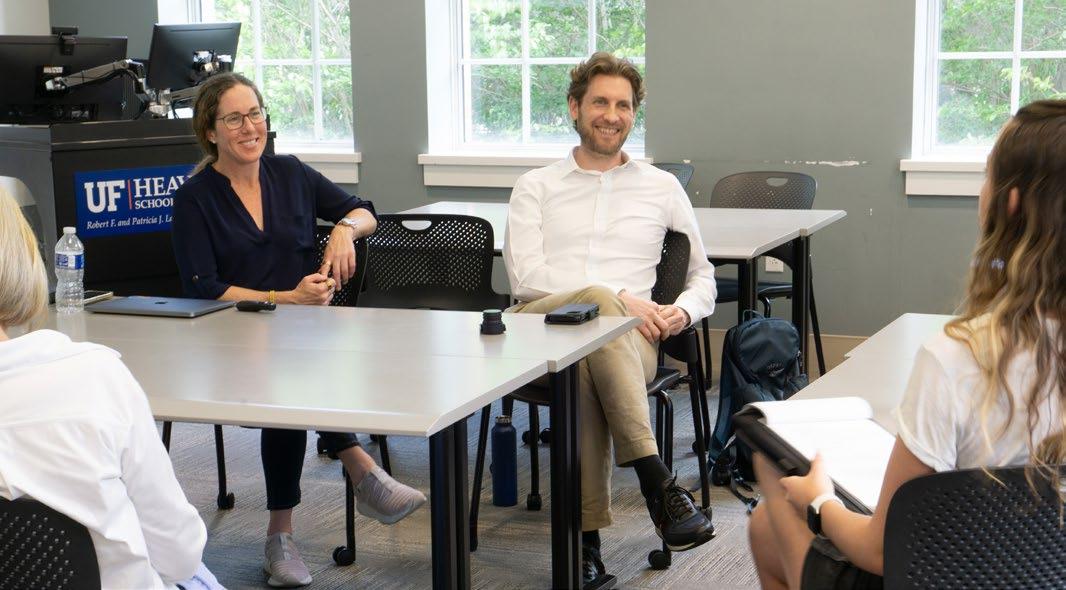
Over the course of three days, Dr. Judith Anderson (Associate Professor of Ethnic and Race Studies, CUNY Borough of Manhattan Community College), Ms. Meghan Reynolds (Senior Director of Growth Marketing, Oura), and Mr. Jacob Schultz (Deputy Director, Office of Transportation Policy, U.S. Department of State) shared expertise and wisdom from their respective fields—academia, business, and government—to students interested in pursuing an international line of work.
In addition to class visits and a panel with all three alumni, breakout sessions focused on the intricacies of each field: Dr. Anderson guided students aiming for success in academia, Ms. Reynolds and Mr. Schultz offered insight on doing business in Latin America, and Ms. Reynolds conducted five mock interviews for students looking to practice their skills.
But on a more fundamental level than learning “how to” and the hands-on practice, interacting with the alumni opened students’ eyes to the types of jobs they might be able to pursue with their degree.
“The LAS alumni sessions gave me a chance to see the range of opportunities that a MALAS education can provide me post-studies,” said MALAS first year Jane Perez, who also

volunteered to moderate the Global Career Panel. “With our visiting alumni’s varied career fields, my peers and I were able to understand the demands of their fields, how we can join these work forces, and the variations of them that would be the best fit for what we hope to accomplish as professionals.”
Dr. Anderson reinforced the importance of tailoring your academic experience to your professional goals. “Your degree isn’t your job title,” she shared with students. “You have to develop skillsets within your degree that will translate to your future careers.”
The most important skills that the alumni highlighted, no matter the field, were intercultural competence, language skills, and interpersonal skills. “More than ever it’s so important to be able to know how to talk to someone face to face, even if it’s uncomfortable,” Mr. Schultz shared.
For Ms. Reynolds, these “soft” skills stand out in a world increasingly driven by data analysis: “Data is important, but you need political, economic, historical context around data to understand it and explain why.” Dr. Anderson summarized it best: “Soft skills are really ‘do or die skills.’ They get you the job. They get you the promotion.”
Ultimately, thanks to the time and attention our three alumni volunteered, students came away from the experience feeling less daunted by that inevitable leap to a career. “By learning about cultural fluency in business, graduate scholarships, and language in global networking, my MALAS cohort feels more prepared for transitioning into professionals and academics in the upcoming year,” Jane reflected.
If you’re a Center alum interested in serving as guest speaker or mentor, please email communications@latam.ufl.edu
John Mason graduated with a MALAS degree (Political Science specialization) in 1998 as part of his training to become a Latin America Foreign Area Officer in the U.S. Army. In that role, he worked in Ecuador and Bolivia, liaising with U.S. embassies and local agencies, and serving in peacekeeping and counter-narcotics programs. He retired as a Lieutenant Colonel in 2006 and spent ten years in Ecuador working in small business development and crisis management initiatives.
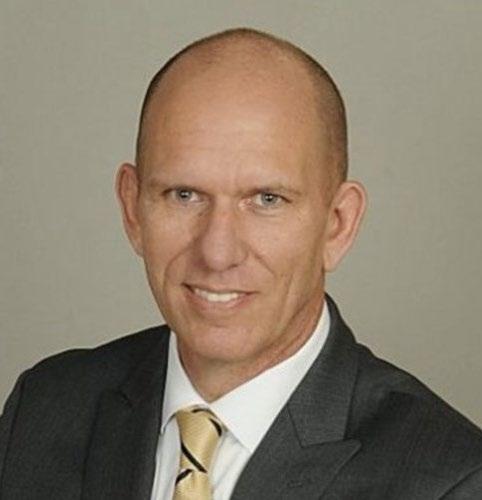
Q: What is your current position?
MASON: Right now, I work for UPS as an industrial engineering planner in New York City, covering Manhattan, up through Harlem, part of Queens, and up to the Hudson Valley. My future is in Ecuador, though. We built a home there, and I hope to semi-retire and teach at one of the universities in Quito.
Q: What motivated you to pursue a MALAS degree?
MASON: I first learned about area studies degrees in the early 1990s when I was an artillery officer in the U.S. Army at Fort Bliss, Texas. My new boss was a foreign area officer who had just come from Cairo. Guys like us, artillery, infantry, armory officers, can go to graduate school, and language school, and then work in embassies around the world in security assistance, security cooperation, things like that. I had a general interest in Latin America; my wife is Ecuadorean, so I decided to apply to the program and become a Latin America Foreign Area Officer. After intensive Spanish classes and a one-year travel study fellowship that took me all through the Americas, I came to Gainesville to study.
Q: What was the most valuable part of your MALAS experience?
MASON: The whole experience was just fantastic. It helped put what I was starting to learn into a scholarly context and really put it together, with access to the resources of the University of Florida and the Center for Latin American Studies. What better place is there? It taught me to look at
the body of literature on a topic, in an academic way, and think about it independently. It takes you to a different level of understanding. So it was very useful to reframe the way I was thinking about things, and it gave me a thirst for learning that I continued later on. And it was critical, just fundamental, to my development in that it helped me understand Latin America better as a region, politically, economically, even the art and religion of the region. It’s all so fascinating, so varied, and changing daily.
Q: How has your MALAS degree informed your career?
MASON: I think the richness of the University of Florida experience was not only learning about the geopolitics of Latin America, but also remembering that there are people affected by all of it. There are policies happening at the governmental level influencing politics and economies of these regions, but we can’t forget individuals. There’s a human side of what we need to learn here, at any university. And the program at UF does a good job at it, because it’s so interdisciplinary. It brings together those things very naturally—the social sciences, the humanities, those aspects come into conversation with politics and business and economics.
Q: What advice would you give students as they pursue their MALAS degree and/or graduate with a MALAS degree?
MASON: I know that each of them is working and studying and reading, and it consumes a good portion of your time. But I would say, always think about other things. It’s good to think about something other than you and yourself. Maybe that means volunteering, for example. I think it’s important to go out and get out of your lane occasionally: go to an art exhibit or concert, go to the engineering demonstration, whatever it is, go to something outside of your focus area and enjoy it.
Q: What career advice would you give students who are about to graduate or planning their professional path?
MASON: Go with an open mind. A door that’s open may not look like the right door at the time, but don’t ignore an open door. An open door has potential to bring opportunities you haven’t considered and allow you space to do things beyond your main line of work. Don’t set your eyes on one target and ignore other things that may pop up, because you’ll never know what may be. At the same time, I would encourage people to look at what’s important to them, what they’d like their lives to look like long down the road, and make decisions that help them reach those big picture goals. Decision making becomes a lot more clear when you keep your vision in mind and make choices that line up with those values. ◆
Undergraduate Minors and Certificates
Ashley Borges (Psychology)
Maria Monsserat De La Cruz Mora (Political Science)
Andrew Gomez (Anthropology)
Nicholas Jones (Political Science)
Steven Manso (Criminology and Political Science)
Camila Pereira (Journalism)
Jordan Quinones-Marrero (Political Science and Economics)
Marielena Romagosa (Political Science)
Jacqueline Sanchez (Political Science and Economics)
MALAS Degree
Sofi-Nicole Barreiro
Thesis topic: Ethnoracial Identity
Formation among Latinx Students at the University of Florida
Specialization: Latinx Studies, Migration & Transnational Studies
Chair: Nicholas Vargas
Luísa Bridi Dacroce
Thesis topic: (Luso)Latinidad and Brazucas’ Racial(ized) Experiences in the United States
Specialization: Latinx Studies, Migration & Transnational Studies
Chair: Nicholas Vargas
Donovan Carter
Thesis topic: Thin Blue Lines: Racialized Policing in the Paro Nacional of 2021
Specialization: Crime, Law, and Governance in the Americas
Chair: Paul Ortiz
Seung Gi Kim
Thesis topic: Historical consequence of ODA sourced infrastructure project in Brazil
Specialization: Development Studies and Economic Analysis
Chair: Susan Paulson
Murielle LeMaire
Thesis topic: Perceptions on Conservation and Devleopment in El Chaco, Ecuador
Specialization: Tropical
Conservation and Development
Chair: Susan Paulson
Thacher Loutin
Thesis topic: The Parents’
Perspective: Black Anglophone Caribbean Students Negotiation of Race and Language in K-12
Educational Spaces in the U.S.
Specialization: Education in the Americas
Chair: Christopher Busey
Juan Carlos Moreno Perea
Capstone topic: Black intellectuals: Underscoring the role that Black intellectuals and Black educators have played in the Afro-Colombian social movement
Specialization: Education in the Americas
Chair: Christopher Busey
Kleber Naula
Thesis topic: From Weavers to Preachers: Visual Memories of Indigenous Protestantism in Ecuador (1954-1967)
Specialization: Indigenous Studies
Chair: Carmen Martínez Novo
Whitney Rodríguez
Capstone topic: Futuros posibles para las vidas desobedientes
Specialization: Race, Diaspora, Gender and Sexuality
Chair: Christopher Busey
Francisco Sánchez
Thesis topic: La Frontera es una Trocha: a woman’s experience surviving along the VenezuelanColombian border
Specialization: Crime, Law, and Governance in the Americas
Chair: Rebecca Hanson
YoVanna Solomon
Capstone topic: Mulata the Asstastic: a Sexual Reckoning. Performative Art and Narrative Auto-Fiction towards Black Futurity
Specialization: Race, Diaspora, Gender and Sexuality
Chair: Christopher Busey
Maricarmen Torres Medina
Thesis topic: Representating violence: a comparative study of the visual images of Fernando Brito and Ken González-Day
Specialization: Arts, Literature and Culture
Chair: Paola Uparela
Graduate LAS Certificates
Fallon Riano Jimenez (MDP)
Hannah Lazar (MA Political Science)
Sebastian Ponce (MDP)
Ivan Diez de la Pava (MA Spanish Literature and Culture)
Trent Gautney (MDP)
Karla Mundim (PhD Political Science)
Omar Hernandez Carmona (MDP)
Oren Okhovat (PhD History)
Sarina Kawall (MDP)
MDP Degree
Sarina Kawall
Specializations: Global Health, LAS, TCD
Advisor: Matt Hallett (Wildlife Ecology and Conservation/TCD)
Capstone Field Practicum: “Humanwildlife conflict as focusing on small carnivores and small livestock in the Rupununi, Guyana.”
Antony Gitei Gathiru
Specializations: Sports
Management, African Studies, TCD Advisor: Marit Østebø (Anthropology/African Studies)
Capstone Field Practicum: “Gender (In)equality and female participation in Sports: A case study of Moving the Goalposts Kilifi, Kenya.”
Katherine McCall
Specializations: Monitoring and Evaluation, African Studies, TCD
Advisor: Sebastian Galindo (Agricultural Education and Communication)
Capstone Field Practicum: “A Qualitative Evaluation of a Systems Thinking Education Program for Youth in Kenya.”
Fallon Riaño Jiménez
Specializations: Integrative Management in Agriculture
Development, African Studies, LAS, TCD
Advisor: Sarah McKune (Environmental and Global Health/ African Studies)
Capstone Field Practicum: “Experiences with the Rwanda Dairy Farm Assessment and Advisory Tool.”
Fraleigh Krause
Specializations: Gender & Development, African Studies, TCD Advisor: Sarah McKune (Environmental and Global Health/ African Studies)
Capstone Field Practicum: “Build the Person, Change the World: Rethinking Care for Orphans and Vulnerable Children.”
Trent Gautney
Specializations: Gender & Development, Global Health, LAS, TCD Advisor: Sarah McKune
(Environmental and Global Health/ African Studies)
Capstone Field Practicum: “Evaluating and improving community engagement for electoral reform in the Cooperative Republic of Guyana.”
Chioma Fidelia Iyamu
Specializations: Soil and Water Science, Environmental Education & Communication, African Studies, TCD
Advisor: Ann Wilkie (Soil, Water & Ecosystem Sciences)
Capstone Field Practicum: “Pilot study of elementary school food waste diversion and composting, Gainesville, Florida.”
Omar Hernández Carmona
Specializations: Entrepreneurship, Social Impact and Sustainability, Nonprofit Organizational Management, LAS, TCD
Co-Advisors: Glenn Galloway (MDP/LAS) Karissa Raskin (MALAS alumna/City of Gainesville)
Capstone Field Practicum: “Facilitating the co-design process of the monitoring and evaluation system of the Partnership for Reimagining Gainesville.”
Sebastian Ponce
Specializations: Spirituality and Wellness, LAS, TCD
Advisor: Sarah McKune (Environmental and Global Health/ African Studies)
Capstone Field Practicum: “Implementing Wellness Tourism: Mindfulness-Based Intervention Services for Sapana Eco-Lodge, Nepal.”
Sustainable Development Practice Certificate
Seung Gi Kim, MALAS
Tropical Conservation and Development Graduate Concentration and/or Certificate
Fallon Riano Jimenez (MDP)
Murielle LeMaire (MALAS)
Sebastian Ponce (MDP)
Trent Gautney (MDP)
Katherine McCall (MDP)
Omar Hernandez Carmona (MDP)
Chioma Iyamu (MDP)
Antony Gathiru (MDP)
Sarina Kawall (MDP)
Congratulations to this year’s winners of the Fieldwork Festival!
Grand Prize
Intra and inter-specific variation of functional composition across successional stages of High Andean Forest
Trocheras: women experiences smuggling, surviving and crossing the Venezuelan-Colombian border
Sustainable Development Practice
SARINA KAWALL
An examination of human-wildlife conflict as it relates to small carnivores and small livestock in the Rupununi region, Guyana
Tropical Conservation and Development
HERNÁN ÁLVAREZ
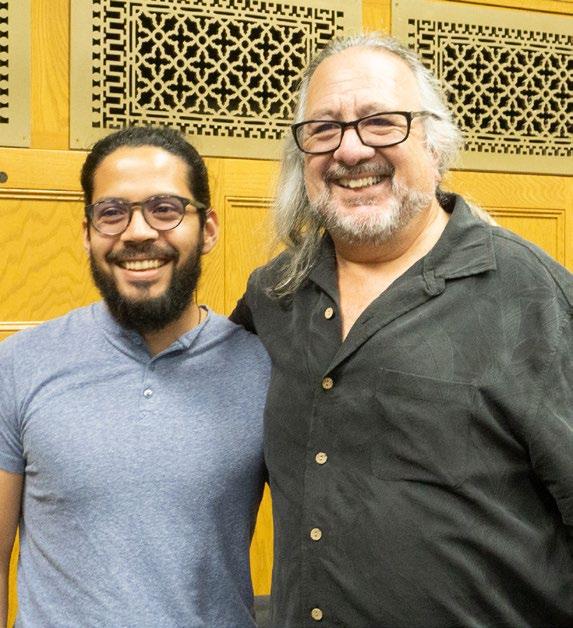
Understanding collaborative network arrangement around wildmeat trade enforcement and regulations in the Ecuadorian Amazon
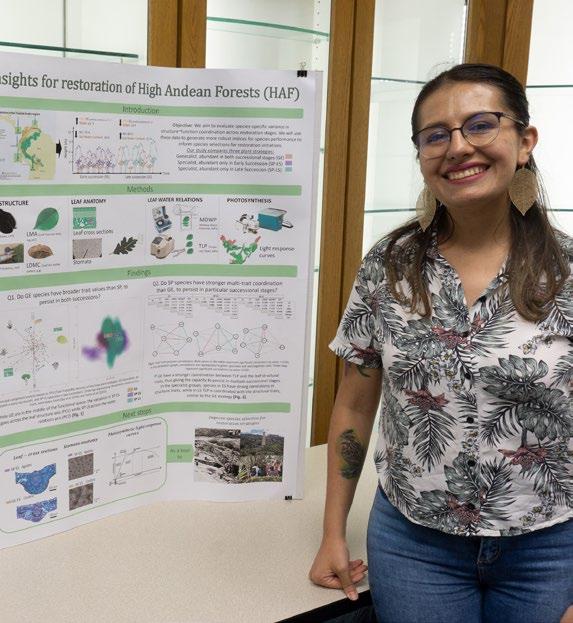
Doctoral candidate
VIVIAN LANTOW
Adorned with Feathers: The workmanship of Pampa la Cruz featherworks and what feathers can tell us about Chimú society
Alumni: please complete our Alumni Update Form online at: bit.ly/3s5H2KA and share your news! If space permits, we will include your update in the next edition of the Latinamericanist.
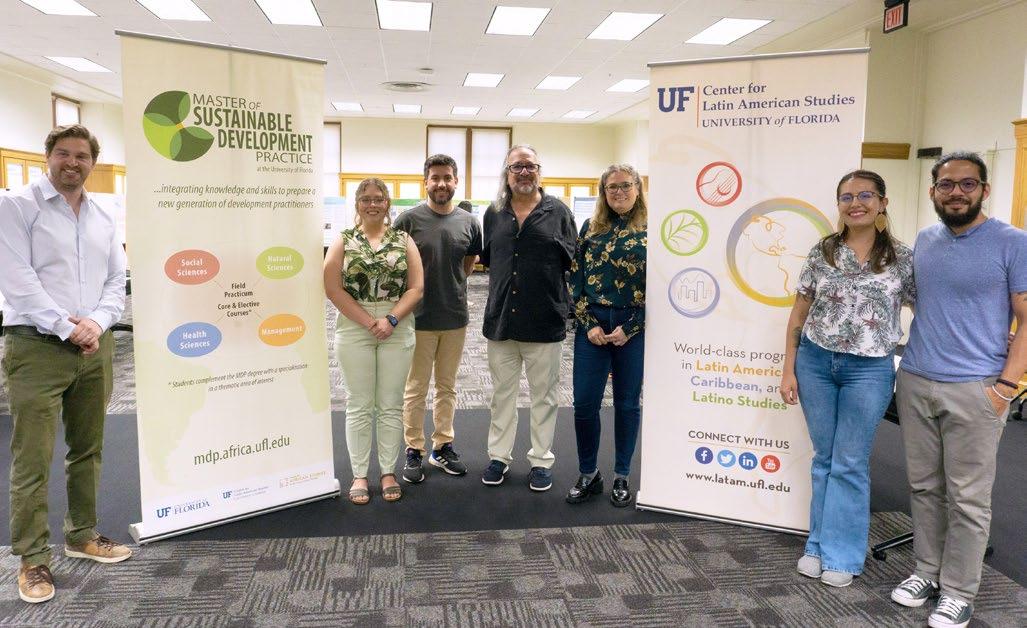
Kerri Hannan (MALAS 1999)
I am currently the Deputy Assistant Secretary for Public Diplomacy and Policy Planning and Resources for the Bureau of Western Hemisphere Affairs, serving since October 2021. I joined the Department of State in 2001 as a Foreign Service Officer. I have served around the world and in Latin America in Bolivia and Argentina.
Andrea Grosse (MALAS/TCD 1993)
I would like to reconnect with students from the early 1990s and network (virtually or in the D.C. area) with alumni from all decades.
Caitlin Schroering (MALAS 2015)
It’s hard to believe that it has been eight years since I graduated! After finishing the MALAS, I began a PhD in sociology at the University of Pittsburgh. I graduated in 2021, and then completed a post doc at the Pittsburgh Collaboratory for Water Research, Education, and Outreach housed in the Dept. of Geology and Environmental Science at the University of Pittsburgh. I am now at UNCC and just completed my first year as an assistant professor in the Dept. of Global Studies. I remain grateful for all
of the amazing support I received and the knowledge I gained in my MALAS classes. The degree prepared me well for the research and exploration to come!
Steven Minegar (MALAS 2010)
Have been with Gartner since 2014 working for the Client Services Organization (2014-2021) and Global Retention Programs (2021-present) servicing clients and sales teams in North America, Brazil and Spanish-speaking LATAM.
Angelica Almeyda Zambrano (LAS/ Spatial Ecology and Conservation Lab)
Book launch: Scheeres, Janneke, Johan de Jong, Benjamin Brede, Pedro HS Brancalion, Eben Noth Broadbent, Angelica Maria Almeyda Zambrano, Eric Bastos Gorgens et al. “Distinguishing forest types in restored tropical landscapes with UAV-borne LIDAR.” Remote Sensing of Environment 290 (2023): 113533.
Ida Altman (History, emerita)
David Wheat and Ida Altman, eds., ‘The seventeenth-century Spanish Caribbean as global crossroads: transimperial and transregional approaches,’ special issue, Colonial Latin American Review 32:1 (2023)
Trent Blare (Food & Resource Economics)
Publication: Oberlack, C., Blare, T., Zambrino, L., Bruelisauer, S., Solar, J., Villar, G., Thomas, E. and Ramirez, M. 2023. With and beyond sustainability certification: Exploring inclusive business and solidarity economy strategies in Peru and Switzerland. World Development. https://doi.org/10.1016/j.worlddev.2023.106187
Impact Factor: 6.7
Mark Brenner (Geological Sciences)
Publications: (1) Yolimar Suárez-Mozo, N., et al. 2023. Molluscs of the Ría Lagartos coastal lagoon, southern Gulf of Mexico. J Mar Biol Assoc UK 103, e19, 1–17. https://doi.org/10.1017/ S0025315423000085. (2) Martínez-Abarca, M., et al. Millennial hydrological variability in the continental northern Neotropics during MIS3-2 inferred from sediments of Lake Petén Itzá, Guatemala. EGUsphere 1-33. https://doi. org/10.5194/egusphere-2022-787
Daniel Contreras (Anthropology) 2023. Contreras, Daniel A. ‘Seeking Synchronicity: Reexamining the Peruvian Early Horizon through Bayesian Modeling of 14C Dates.’ In Seki, Yuji, ed., ‘New Perspectives on the Early Formation of the Andean Civilization: Chronology, Interaction, and Social Organization’. Osaka: National Museum of Ethnology. _Senri Ethnological Studies_ 112:127-151.
Carmen Diana Deere (LAS/FRED, emerita)
Co-authored “Identidad de las mujeres casadas: el uso del ‘de’ en sus apellidos en Colombia,” Revista de Estudios Sociales, 2023, No. 84: 19-39.
Carlos de la Torre (LAS)
Book Chapter: with Treethep Srisa-nga “Populismos del Siglo XXI” in Melany Barragán and Salvador Martí i Puig, eds., América Latina. Democracias Frágiles y Conflictividad, Valencia: Tirant Humanidades, 2023, 293-315. Invited Lecture: “Populismos Globales” Universidad de Puerto Rico, Río Piedras, March 13 and 15, 2023.
Silvio Dos Santos (Music) Award: Recipient of the 2022-2023 Faculty Doctoral Mentoring Award. His mentoring statement is available at http://graduateschool.ufl.edu/faculty-staff/awards/faculty-doctoral-mentoringaward/2022-2023-mentoring-award-winners/ dr-silvio-dos-santos.html. Book chapter: “Alban Berg’s Eclectic Serialism” in M. Iddon (Ed.), _The Cambridge Companion to Serialism_ (Cambridge Companions to Music, pp. 73-86). Cambridge: Cambridge University Press. doi:10.1017/9781108592116.006
Brian Gendreau (Finance, Insurance and Real Estate) Presented “The Mexican Revolution and the Bond Markets” at the World Finance and Banking Symposium, Miami, February 16, 2023.
M. Elizabeth Ginway (Spanish & Portuguese) participated in a symposium on Latin American Science Fiction held at Yale University, “The New Worlds in the New World” on March 4, gave a paper at the International Conference on the Fantastic in the Arts in Orlando on March 15, took part in a panel with director Alex Rivera on his film Sleep Dealer at the University of South Florida on April 17, and gave a paper on the MLA translation of the 1908 transgender novel Esfinge by Coelho Neto at the Kentucky Foreign Language Conference on April 21.
Rebecca Hanson (LAS) Conference event: Grant from the Center for the Humanities and the Public Sphere, University of Florida for Visualizing & Sensing Spaces: A Workshop Series, Amount: $3,760.
Benjamin Hebblethwaite (Languages, Literature, and Culture) published an edited volume (with Silke Jansen) titled, “Indigenous and African Diaspora Religions in the Americas,” including 360 pages, 25 photographs, 7 illustrations, 5 maps, 2 charts, index, and a 60-page introduction + 9 chapters. The volume includes the authors LeGrace Benson, Eleanor A. Laughlin, Daniel J. Frim, José María Santos Rovira, Robin M. Wright, Ana Mariella Bacigalupo, Francisco Iritamei Benítez de la Cruz and Itxaso García Chapinal, Dereck Daschke, and Jeffery M. Gonzalez. Published by the University of Nebraska Press. The book appeared on April 28, 2023, and is available from booksellers online.
Tace Hedrick (English) In Press: Hedrick, Tace. “’Their Walmart Polyester Pants Smell Like Tamales’: Chica Lit and the Politics of Latinx Social Mobility.” Myra Mendible, ed. American Fury: Collective Action and the Politics of Moral Outrage. Harcourt. Invited Conference Paper: Hedrick, Tace. “Gothic and the Politicized Narrative in Silvia Moreno-
García’s Mexican Gothic.” Latinx Visions: Speculative Worlds in Latinx Art, Literature and Performance. University of New Mexico, March 9-11, 2023.
Emily Hind (Spanish & Portuguese)
Interviews: one with a Mexican author and one with an Oscar-winning art director, and a chapter in an edited volume. (1) Interview with Jazmina Barrera. Hispamérica, Vol. 51, No. 153 (2022), pp. 77-83. (2) Interview with Brigitte Broch. “Las plantas en el cine mexicano: ¿desastre ecológico o remedio visual? Conversación con la diseñadora de arte Brigitte Broch sobre Solo con tu pareja (1991), Sexo, pudor y lágrimas (1999) y Amores perros (2000).” Balajú. Vol. 17, No. 448-4954 (2022), pp. 100-110. Publication: “The SlowedDown Showdown: Energopower in Valeria Luiselli’s Lost Children Archive (2019) and Álvaro Enrigue’s Ahora me rindo y eso es todo (2018).” In The Literary Western in the Global Imagination edited by Christopher Conway, Marek Paryz, and David Rio. Brill, 2022, pp. 90-109.
Andrew Janusz (Political Science) published an article, The Electoral Consequences of Racial Fluidity.” in Electoral Studies, and presented papers on Brazil at the Continental Conference on Afro-Latin American Studies, the Politics of Race, Immigration, and Ethnicity Consortium, and the Midwest Political Science Association. He gave an invited lecture at Ohio State University sponsored by the Center for Latin American Studies and OSU Brazil Gateway. Lastly, he was also selected as a research fellow with the Washington Brazil Office
Karen Kainer (LAS/School of Forest, Fisheries, and Geomatics Sciences)
Publications: (1) Violato Espada, A.L. and K.A. Kainer. 2023. Women and timber management: From assigned cook to strategic decisionmaker of community land use. Land Use Policy 127:106560. https://doi.org/10.1016/j. landusepol.2023.106560 (2) Ortiz Timoteo, J., K.A. Kainer, M.L. Cavazos, E. García Moya, O. Sánchez Sánchez and H. Vibrans. 2023. Trees in pastures: local knowledge, management, and motives in tropical Veracruz, Mexico. Agroforestry Systems. https://doi.org/10.1007/ s10457-023-00819-1
Carmen Martínez Novo (LAS) Publication: El desmantelamiento del multiculturalismo en Ecuador: Extractivismo y Derechos Indígenas. Quito, Ecuador: Abya Yala, 2023. Invited talks: Invited to radio program “Hilando Fino”, Radio Universidad, Universidad de Puerto Rico-Río Piedras to discuss new book Undoing Multiculturalism (Pittsburgh 2021). Workshop: Participated in a publishing Workshop with
Melody Fonseca, editor of Caribbean Studies, at Facultad de Humanidades, Universidad de Puerto Rico. News: Under the guidance of Dr. Martínez Novo as editor in chief, LARR’s impact factor increased from 0.779 to 1.272 and its cite score rose from 1.2 to 1.5 in 2021. While LARR scored lower for impact factor and cite score than its benchmark journals in 2020, it is now scoring higher than other top interdisciplinary journals in the field of Latin American studies.
Crystal Marull (Spanish and Portuguese) Award: 2023 UF Online Educator of the Year Award - Granted by the UF Center of Teaching Excellence (This is a university wide competition equivalent to the UF Teacher of the Year award. The winner of which goes on to compete statewide for the Florida Online Educator of the Year Award.)
Susan Milbrath (Florida Museum of Natural History) Publications: (1) Drought-Induced Civil Conflict Among the Ancient Maya. Nature Communications 2022 (Douglas J. Kennett et al. Milbrath no. 11 of 30 coauthors. https://doi. org/10.1038/s41467-022-31522-x (2) Seasonal Cycles, Veintena Rituals, and Yearbearer Ceremonies in Central Mexico. Trace 81:247248, Enero 2022.
Susan Paulson (LAS) Keynote Lecture: Diálogo entre la resistencia al extractivismo, los movimientos agroecológicos en Ecuador, y el descrecimiento de las economías ricas. Conferencia: Otro Ecuador es posible: experiencias y reflexiones hacia un más país más sostenible. Pontificia Universidad Católica del Ecuador, Quito. Invited Lectures (virtual): (1) Pluriversal learning with Agroecology, Buen Vivir, Zapatismo, Feminisms. Centre for Alternative Technology, Wales, UK. (2) El descrecimiento: horizonte de transformaciones decoloniales. Universidad Andina Simon Bolivar, Quito. Conferences: (1) Co-hosted workshop on Feminisms and Degrowth with 65 participants from a dozen countries. Lund University, Sweden. (2) Radically rethinking care through the pandemic and beyond. Paper at American Anthropology Association Annual Meetings, Seattle.
Stephen G. Perz (Sociology and Criminology & Law) Stephen Perz and Jorge Castillo’s book, “The Road to the Land of the Mother of God: A History of the Interoceanic Highway in Peru” will be published in May 2023 by the University of Nebraska Press. The history spans the origins of the road in indigenous trade networks to the Incan empire, Spanish conquest, missionary exploration, the rubber boom, the development period, and the Initiative for the Integration of Regional Infrastructure in South America. In that context, the book reviews the inadequate planning for the highway and the complicated impacts that ensued. The history concludes with the Lava Jato corruption scandal that made the highway possible, and reflections on lessons
from infrastructure history for the governance of infrastructure.
Heidi Powell (Art+Art History) has returned from serving as a Fulbright Scholar in the Dominican Republic working with the Chavon School of Design, the Leon Center, and Hope Academy serving teaching professionals by conducting workshops on Pedagogy and Arts Practice. Heidi also conducted research on arts and conservation practice relevant to culture where she documented places that serve as natural resources through image and sound.
David O. Prevatt (Civil & Coastal Engineering) Publication: Castillo, R. et al. (2023) “The Balao, Ecuador Mw 6.8 Earthquake of March 18, 2023” Released: April 14, 2023; NHERI DesignSafe Project ID: PRJ-3891; Nat. Science Foundation. Published report: StEER: 2023 Ecuador Earthquake Preliminary Virtual Reconnaissance Report (PVRR)”, in StEER - 18 March 2023, Ecuador, Mw 6.8 Earthquake; https://www.designsafe-ci.org/data/browser/ public/designsafe.storage.published/ PRJ-3891/#details-3284995974506999315242ac11b-0001-012
Mary Risner (LAS) was a plenary speaker at the Jornadas de Español para Fines Específicos (JEFE-Vi) at the Vienna University of Economics and Business, invited to lead a Business Portuguese workshop at Florida International University, and to deliver a virtual talk for the Florida Association of Career and Technical Education (FACTE).
Scott Robinson (Florida Museum of Natural History) Montano-Centellas, F, HH Jones, IJ Ausprey, FL Newell, J Munoz, GG Mangini, ME Fanjul, B Tinoco, G Colorado Z, J Cahill, E Arbelaez, O Marin-Gomez, PX Astudillo, E Guevara, S Ippi, M McDermott, A Rodewald, E Matthysen, SK Robinson. 2023. Network structure of avian flocks decays with elevation and latitude across the Andes. Philosophical Transactions of the Royal Society B
Eugenio Rojas (Economics) (1) A Macroeconomic Model of Healthcare Saturation, Inequality and the OutputPandemic Tradeoff” (with Enrique Mendoza, Linda Tesar and Jing Zhang). Forthcoming at the IMF Economic Review. (2) “Non-Homothetic Sudden Stops” (2022) (with Felipe Saffie). Journal of International Economics, Volume 139, November.
Maya Stanfield-Mazzi (Art+Art History)
Book/book chapter: “Artists as Activists: The Development of Indigenous Artists’ Rights during the Sixteenth Century.” In Collective Creativity and Artistic Agency in Colonial Latin America. Edited by Maya Stanfield-Mazzi and Margarita Vargas-Betancourt. Gainesville: University Press of Florida, 2023.
Catherine Tucker (LAS / Anthropology)
Tucker, C.M., Šmid-Hribar, M., Urbanc, M., Bogataj, N., Gunya, A., Rodela, R., Sigura, M. & Piani, L. 2023. Governance of interdependent ecosystem services and common-pool resources. Land Use Policy 127: 106575. https:// doi.org/10.1016/j.landusepol.2023.106575
Paola Uparela (Spanish & Portuguese)
Publication: Uparela, Paola. “‘Multiplicarse ha la tierra de gente y de fruto’: Gender and Re-production in Las Casas’s and Guaman Poma’s Biopolitical Projects (1516, 1615).” In The Transatlantic Bartolomé de las Casas: Lascasian Heritage, Indigenous Cultures, Scholastic Thought, and Historical Reception. Leiden, The Netherlands: Brill, 2022. Awards:
(1) LASA - José María Arguedas Essay Award: “‘Multiplicarse ha la tierra de gente y de fruto’: Gender and Re-production in Las Casas’s and Guaman Poma’s Biopolitical Projects (1516, 1615)” (Brill, 2022). (2) 2023 Sturgis Leavitt Award for the best article: “‘Yo llana estoy’ o el despliegue de una virginidad queer” (Revista de Estudios de Género y Sexualidades, 2022) by the South Eastern Council for Latin American Studies (SECOLAS).
Margarita Vargas-Betancourt (Latin American and Caribbean Collection) Book/ book chapter: Vargas-Betancourt, Margarita. “The Pochteca Angelina Martina: Supplying Mexico City’s Art World in the Sixteenth Century.” In Collective Creativity and Artistic Agency in Colonial Latin America. Edited by Maya Stanfield-Mazzi and Margarita VargasBetancourt. Gainesville: University Press of Florida, 2023. Podcast: Vargas-Betancourt, Margarita, Patrice Green, and Jina DuVernay, “Hidden Histories: Immigrant Farm Workers and Black Intellectual Histories.” In Counter Narratives in Practice, work of the Andrew W. Mellon Fellows for Diversity, Inclusion & Cultural Heritage based at the Rare Book School. 2023.
https://chfellowspodcasts.pubpub.org/
Wagner Vendrame (Environmental Horticulture) Last January, we conducted a technical visit to Colombia, including CIAT (International Center for Tropical Agriculture), CENICANA (Colombian Sugarcane Research Center), CENICAFE (Colombian Coffee Research Center), Orquideas Del Valle (Orchid Grower), and CVC (Cauca Valley Corporation). The visit included some faculty and graduate students from the Environmental Horticulture Department, providing a great experience, especially for some of our graduate students, their first international activity. Support was provide by the Environmental Horticulture Dept., the Global Food Systems Institute and the UF International Center. We have also developed an internship program for University of Antioquia students at UF for summer 2023 in collaboration with the UF Agronomy Dept., funded by 100,000 Strong for the Americas.
Heather Vrana (History) Publications: (1) “Disability in Guatemala,” The Oxford Research Encyclopedia of Latin American History, ed. Stephen Webre. New York: Oxford University Press. (2) “Obituary. Diane M. Nelson (1963-2022),” Hispanic American Historical Review 103, no. 1. (3) “Todo El Amor: Disability Internationalism and the FMLN,” Social History (Special Issue on Youth and Transnationalism) 48, no. 1 (February 2023). Presentation: “Mines,
Minors, and Medicine among the FMLN.” Southeastern Conference on Latin American Studies. Antigua, Guatemala, March 22-26.
Welson Tremura (LAS/Music) The Brazilian Music Institute (BMI), May 15-19, 2023, will be held at the New World School of the Arts (NWSA) in downtown Miami. The Institute aspires to build great artistry and to teach UF and NWSA students and other music professionals to perform and experience
Brazilian music and culture during a week of musical practices and training activities. With a mission of promoting Brazilian music and culture, the 2023 BMI expands its outreach in Miami with the collaboration of the New World School of the Arts faculty and students. This powerful musical and cultural experience was founded and designed by Professor Welson Tremura in 2001 at the University of Florida in Gainesville.
Dr. Nicholas Vargas is departing the Center for the Department of Ethnic Studies at the University of California, Berkeley (UCB). Dr. Vargas has been affiliated with the Center since he began working at the University of Florida in 2015. In 2019, he became a Center-based faculty member. During his eight years with the Center, Dr. Vargas has served as the specialization coordinator for Latinx Studies, Migration & Transnational Studies.
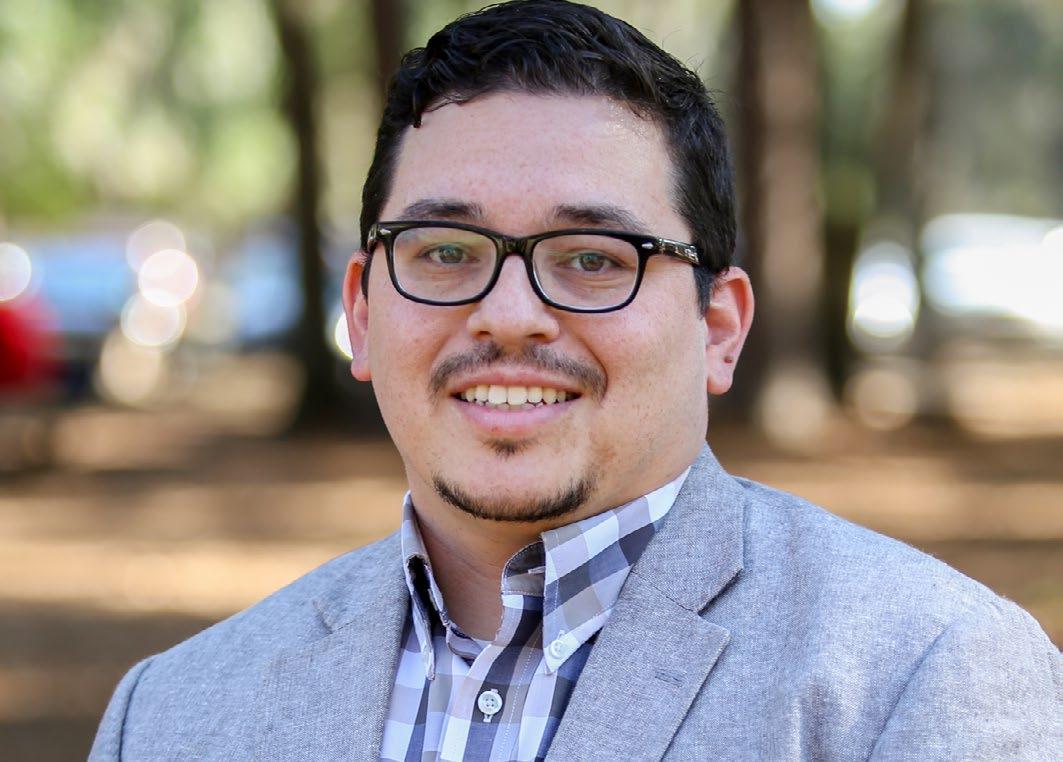
Not only an effective instructor and mentor, Dr. Vargas’s impact on many of his students came in the form of personal reflection on their own immigrant and/or Latinx experience in the United States. He has served as the chair of numerous MALAS thesis committees, offering guidance and support to students throughout their academic journeys.
From student and advisee Sofi-Nicole Barreiro: Latinx Studies courses with Dr. Vargas have influenced mine and countless other students’ lives at UF. Dr. Vargas, I simply cannot imagine my life today without the knowledge that you helped co-create in your classrooms, meeting spaces, and beyond. Thank you for being such an empowering professor, mentor, and advisor— you will be very missed!
Best wishes, Dr. Vargas, for your next chapter and exciting new opportunities in California! ◆
Dr. Christopher Busey is departing the Center to serve as the Vice President of Diversity, Equity, Inclusion and Community Impact for the United Soccer League. Dr. Busey has been affiliated with the Center since he began working at the University of Florida in 2017. In 2021, he became a Centerbased faculty member and co-coordinator of the Education in the Americas specialization.
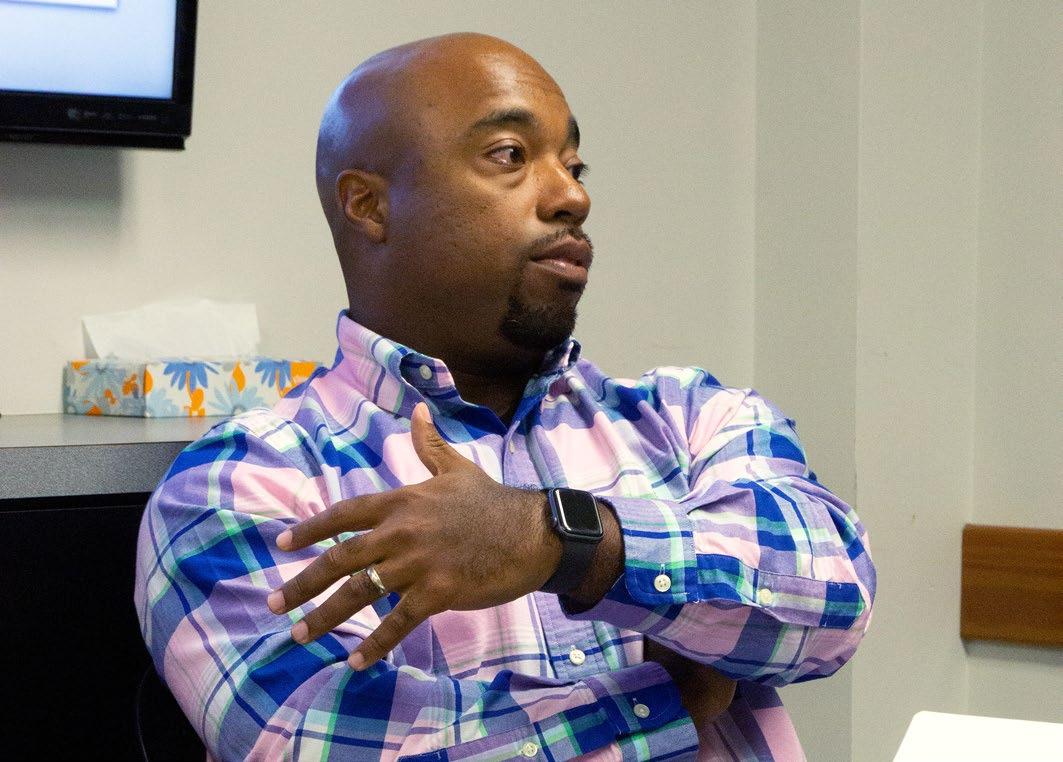
Dr. Busey’s impact at the Center brought focus on education in the African diaspora across the Americas, in particular by understanding education as a political act. Committed to supporting student intellectual thought and academic experience alike, Dr. Busey has been embraced by students as both professor and mentor.
From student and advisee Juan Carlos Moreno Perea: Have you ever had a professor who is committed and passionate about the courses he teaches? Or a professor that demands excellence and patiently guides you to reach your goals? Or a professor who cares about you not only as a student but also as a human being? A professor who is extremely knowledgeable and makes you feel indispensable in the classroom? That professor is Dr. Busey. He made a remarkable impact on his students both academically and personally.
Best wishes, Dr. Busey, for your next chapter and the positive impact you’ll continue to have! ◆
Center faculty Dr. Emilio Bruna (Wildlife Ecology and Conservation) has been recognized as a Fellow of the American Association for the Advancement of Science, the world’s largest general scientific society and publisher of the Science family of journals. Dr. Bruna joined the University of Florida and the TCD program as a core faculty member in 2002. His research examines how the demography and population dynamics of tropical plants are influenced by human activities such as deforestation and climate change, and factors influencing geographic disparities in the production and spread of knowledge, with an emphasis on scholarship from Latin America. At UF, he has received numerous awards, including being recognized as a Distinguished Teaching Scholar. He currently serves as Past-President of the Association for Tropical Biology & Conservation and Secretary of the Ecological Society of America. ◆
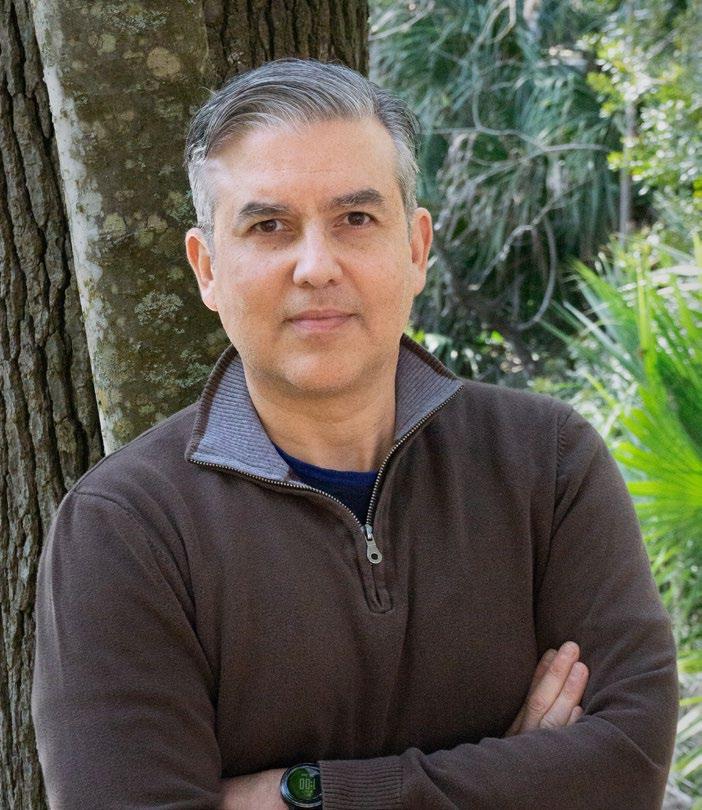




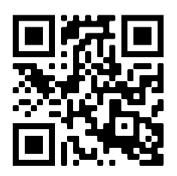
Associate Director of Administrative Services Jessica Mrozinske Baker has been awarded the a Division Three Superior Accomplishment Award. Ms. Baker stewarded the Center through the preparation and submission of two U.S. Department of Education proposals that resulted in over $2 million in federal funding for the Center. She was also instrumental in managing Center staff in the transition toward a postpandemic workplace.
Prior to this position, Ms. Baker served as the Center’s Accounting Coordinator for 19 years, after four years working in other units at the University of Florida. Her longterm experience striving to facilitate the Center’s fiscal needs for students and faculty alike made her singularly qualified to steward the Center through the unique demands of the pandemic and an extensive federal funding proposal process.
Congratulations to Jessica Mrozinske Baker for this accomplishment, and thank you for all you do for the Center and our community!

Katalin Rac
Isser and Rae Price Library of Judaica
George A. Smathers Libraries
College
ofJournalism and Communications
Kym Hodges Event & Conference PlannerThe Center for Latin American Studies would like to express gratitude for the generosity of those who have contributed to the Center’s funds and endowments:
Boonstra Family Research Fellowship
Carmen Diana Deere
Eleonora Rossi
Carmen Diana Deere Director’s Fund
Carmen Diana Deere
Glenn Galloway
Aimee Green & Abhimanyu Lokesh
Colonel Glenn A. Farris Scholarship
Christine Farris-Edwards & Thomas Edwards
Cuba Program Fund
Jay Brickman
Hugh L. Popenoe Mesoamerican Research Endowment
Kristen Conway-Gomez PhD & Luis Gomez
Latin American Studies Unrestricted
Allison Alsup
Jose Ruben & Helen Alvarez
Matilde Galan and Brett Borchers
Katie L. Coldiron
Ana Karina Garcia De Dios
Kendall Grace Jung
Mark P. & Deborah E. Kisker
Joanne Maria Kreinbihl
Crisne Lebron
Maria Cristina Leite
Maria J. Longa
Theresa Martinez
Juan Montero
Leslie Karina Pappa
Patricia Delamonica Sampaio
Maya Stanfield-Mazzi & Manuel Mazzi
Maria Carolina Suarez & Edward G. Sullivan
Eugene F. Taggart
Marta L. Wayne & Charles F. Baer
Tonyaa & Wallace Weathersbee
McCoy Latin American Travel Scholarship Fund
Terry L. McCoy & Elizabeth Lowe
Michael James Whitehead
MDP Program Unrestricted
Glenn Galloway
Sarina Alexandra Kawall
Bette A. Loiselle & John G. Blake
Kerry K. Pirrone
Fallon Yamile Riano Jimenez
Patricia Delamonica Sampaio
Renata Serra
Marta L. Wayne & Charles F. Baer
Richmond F. Brown Graduate Student Travel Fund
Garfinkel Immigration Law Firm
Bette A. Loiselle & John G. Blake
Safa Graduate Student Travel Endowment
Donald Edward D’Orto Jr.
Schmink Fund for Innovation in Tropical Conservation & Development
Aimee Green & Abhimanyu Lokesh
Felipe V. Gutierrez
Bette A. Loiselle & John G. Blake
Richard Wallace
Tropical Conservation & Development Fund
Wendy Askew
John G. Blake
Farah M. Carrasco Rueda
Sinomar Ferreira Da Fonseca Junio
Silvia Melo. Futada
Glenn Galloway
Felipe V. Gutierrez
Hermudananto
Omar Hernandez Carmona
Christie Ann Klimas
John G. Blake & Bette A. Loiselle
Maxwell-Hanrahan Foundation
Aldila Paramita
Ignacio Porzecanski & Martha E. Kohen
Fallon Yamile Riano Jimenez
Shady Susana Ruiz Diaz
Gabrielle R. Salazar
Patricia Delamonica Sampaio
Natalia Uribe Castaneda
Ana Yoko Ykeuti Meiga
Vivian G. Nolan Graduate Fellowship
Christopher E. Baker
Kislak Family Foundation, Inc.
The contents of this newsletter were developed under the National Resource Center grant from the U.S. Department of Education. However, those contents do not necessarily represent the policy of the U.S. Department of Education, and you should not assume endorsement by the Federal Government.
319 Grinter Hall
P.O. Box 115530 Gainesville, FL 32611-5530
We rely on contributions from our friends and alumni to support certain special activities such as student field research, travel to conferences, and seed support for larger fundraising efforts. If you would like to make a donation to the Center, please visit the Center’s online giving page at go.ufl.edu/las-give or fill out the form below.
MY GIFT IS TO BENEFIT:
• Boonstra Family Research Fellowship (014091)
• Carmen Diana Deere Director’s Fund (019905)
• Carol French Doughty Memorial Fund (016269)
• Colonel Glenn A. Farris Scholarship (005067)
• Cuba Program Fund (017435)
• Florida-Brazil Institute (007277)
• Peter E. and Marie E. Hildebrand Scholarship Fund (022009)
• LAS Alumni Graduate Student Travel Fund (012521)
• Latin American Studies Fund (011147)
• McCoy Travel Scholarship Fund (014527)
• MDP Program Unrestricted (020485)
• Hugh L. Popenoe Mesoamerican Research Endowment (018331)
• Richmond F. Brown Graduate Student Fund (020871)
• Safa Graduate Student Travel Endowment (013515)
• Schmink Fund for Innovation in TCD (018201)
• Tropical Conservation and Development Fund (017809)
• Vivian G. Nolan Graduate Fellowship in LAS (016143)
• Wagley and Carter Fellowships (004763)

GIFT AMOUNT: $500 $250 $100 $50 $_________
Name:
Address:
City/State/Zip:
Email:
METHOD OF PAYMENT:
• Check (Make check payable to: UF Foundation, Inc.) Please send your check with this form to: University of Florida Foundation Gift Processing Department P.O. Box 14425 Gainesville, FL 32604-2425
• Credit Card
Call the UF Foundation’s Gift Processing toll-free number with your credit card information: 1-877-351-2377
This secure line is staffed Monday – Friday from 8:00 am to 4:30 pm
• Online at go.ufl.edu/las-give